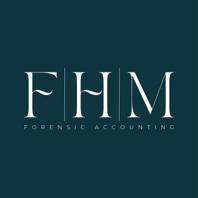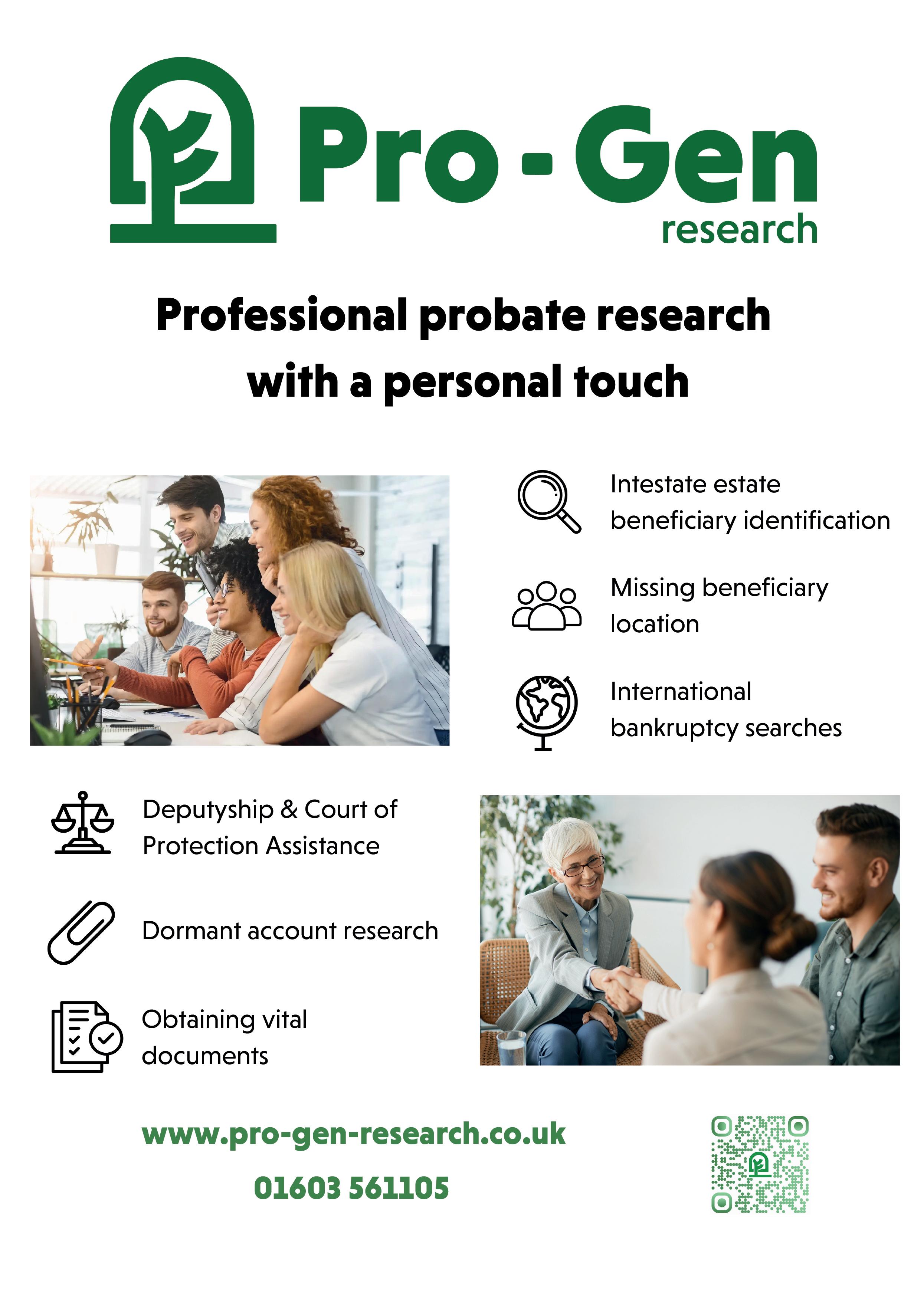




















James Allen President, Partner, Head of Cambridge Corporate Team, Birketts LLP
In today’s legal landscape, expertise alone is no longer enough. Whether you are a newly qualified solicitor or a senior partner, the strength of your personal brand can directly influence your career progression, client relationships, and professional standing. In a city like Cambridge, where innovation meets tradition and world-class industries flourish alongside centuries-old institutions, building your own brand is not just a nice-to-have - it is a strategic imperative.
The idea of personal branding might seem like a marketing buzzword, but at its core, it is about reputation - how people perceive you, what they associate you with, and what you are known for.
For lawyers, whose currency is trust and credibility, a strong personal brand can:
l Attract new clients and retain existing ones
l Differentiate you in a competitive market
l Position you as a thought leader in your area of expertise
l Create opportunities for collaboration and professional growth.
Personal branding does not mean self-promotion for the sake of it. It’s about defining and communicating your values, strengths, and specialisms in a way that is authentic, consistent, and purposeful.
Social media is a powerful vehicle for building and amplifying your personal brand. Platforms like LinkedIn, X (formerly Twitter), and even Instagram are not just for influencers and entrepreneurs - they are for professionals who want to build visibility and credibility.
LinkedIn is the natural starting point for lawyers. It is where you can share articles, comment on legal developments, highlight successes (mindful of confidentiality), and demonstrate your interest in key sectors. Thoughtful posts about recent cases, policy changes, or legal trends can position you as a knowledgeable and approachable expert in your field.
X allows for quick insights and commentary, perfect for showcasing agility on current affairs and engaging in real-time conversations. It is especially valuable for public law, employment, tech, and regulatory lawyers who want to remain visible on fast-moving issues.
Instagram and TikTok, while less traditional, are increasingly used by law firms and younger lawyers to humanise the profession, demystify the legal process, and reach broader or younger audiences. Depending on your niche and tone, these platforms can support brand authenticity and approachability. Consistency is key. Whether you are speaking at a local business event, writing an article, or posting online, your messages should reflect your core values and areas of expertise. Think of every touchpoint - online or offline - as an opportunity to reinforce your brand.
In Cambridgeshire, we have a distinct advantage when it comes to personal branding - we are part of Brand Cambridge. Our region is synonymous with academic excellence, scientific advancement, and global innovation. The presence of the University of Cambridge, the Silicon Fen tech cluster, and leading biotech and clean energy companies offers unique opportunities to align your legal brand with the values and industries that make this region thrive.
Ask yourself: What is Cambridge known for, and how can I align my practice with that identity?
l Technology and Start-ups: If you are a commercial or IP lawyer, Cambridge’s start-up ecosystem
is an ideal space to build a niche. Offering guidance on fundraising, scale-up strategies, or data protection in this dynamic sector positions you not just as a legal adviser but as a strategic partner.
l Biotech and Life Sciences: Cambridge is a global hub for medical research and biotech innovation. Lawyers who understand the nuances of regulatory law, intellectual property, and cross-border collaboration can make their mark by offering tailored content, events, or legal updates for this sector.
l Academia and Research: Whether advising on university spinouts, tech transfer, or publishing rights, being conversant in academic legal issues can help you stand out in Cambridge’s world-renowned academic community.
l Sustainability and CleanTech: With growing investment in green technologies and sustainable practices, lawyers can build their brands around environmental law, ESG compliance, or sustainable business advice.
At Cambridgeshire Law Society, we recognise the value of helping our members cultivate strong professional identities. Through networking events, speaker panels, and CPD opportunities, we encourage lawyers at every stage of their career to reflect on their strengths and embrace their unique story.
We are not just legal professionals - we are advocates, advisors, and ambassadors of our city. When you build your brand in alignment with the values of Cambridge and Cambridgeshireinnovation, excellence, collaborationyou not only grow your own practice, but you help elevate the legal profession as a whole.
So whether you are publishing an article on biotech regulation, sharing insights from a fintech conference, or mentoring local students, you are not just building your brand - you are building Brand Cambridge.
Let’s do it, together.
President
James Allen Birketts
Vice President
Fiona McLeman FM Family Law
Deputy Vice President
Joanna Cotgrove Ashtons Legal
Honorary Secretary
Anna Mortenson, Nichino Europe
Honorary Treasurer
Gary Hanson
Barristers Rep
Joshua Walters Fenners Chambers
University & Community Partnerships Officer
John Wright
Corporate Sponsorship Officer
Fiona McLeman FM Family Law
Council Member
Michael Frape Ashtons Legal
CSR & Pro Bono Officer
Alex Curnow Mills & Reeve
Equality, Diversity & Inclusion Officer
Scott Smith Thomson Webb & Corfield
In House Lawyers Rep
Guy Wheeler Cambridge University Press & Assessment
Junior Lawyers Division Representative
Ebony Flack Ward Gethin Archer
LEA Officer
Raina Victor Endomag
L&D Officer
Chris Hoole Appleyard Lees IP
Parliamentary Liaison Officer
Chris Thomas Appleyard Lees IP
Patent Attorneys Rep
Kealan Fallon Appleyard Lees IP
PR & Social Media Officer
Josie Beal Birketts
Publications Editor
Kate Harris Birketts
Social Events Officer
Jonathan Dattani Ashtons Legal
Sole Practitioners and Small Firms Rep
Sophie Scotcher Myers Law
Administrator
Penelope Harrington
MEETINGS 2025
Tuesday 4 November
Committee Meeting
On Zoom 5.30pm
2025
Wednesday 16 July
Garden Party
Trinity Hall, Trinity Lane, Cambridge, CB2 1TJ, 6.00pm – 8.30pm
Thursday 2 October
NQ/Trainee Celebration
Venue TBC, 5.30pm – 7.30pm
Thursday 13 November
Tenpin Bowling Night
Cambridge Leisure Park, Clifton Road, Cambridge, CB1 7DY, 6.00pm – 8.00pm
Wednesday 10 December
Festive Networking Drinks
The Clayton Hotel, 5.30pm – 7.30pm
Friday 17 April 2026
Legal Excellence Awards 2026
Queens’ College, Cambridge CB3 9ET, 6.00pm – 1.00am


Michael Frape Law Society Council Member for Cambridgeshire and Peterborough, Chairman Ashtons Legal LLP
The SRA and Axiom Ince Axiom was an ‘accumulator’ law firm. Throughout its growth to a firm turning over £107m in 2022-2023, its managing director, Pragnesh Modhwadia, remained its sole owner as well as being its sole COLP and COFA. In terms of risk profile, Ince would have scored very highly with the SRA.
In October 2022, the SRA carried out an investigation into Axiom Ince Limited (Axiom) after the firm self-reported itself in respect of a former employee. An Investigation Officer was appointed to carry out a investigation. It should have followed the SRA’s standard procedure. Unfortunately, the Officer did not do so. Although the investigation focused on the activities of the former employee, it also involved a review of Axiom’s books of account and other documents. No breaches of the SRA Accounts Rules 2019 were identified. This was a mistake.
In July 2023, the SRA investigated Ince again and this time discovered what is alleged to have been a large and complex fraud relating to c. £60m of missing client funds. The SRA intervened into Axiom in October 2023 and the firm ceased trading shortly afterwards. The alleged fraud was reported to the SFO and their investigation is continuing.
The effect of the fraud has been significant. Not only has it had a negative impact on consumer confidence in solicitors, it has also caused a massive hike in contributions to Compensation Fund. For the financial year 2023-2024, contributions have increased for individual solicitors from £30 to £90 and for firms from £660 to £2,220.
In January 2024, the LSB commissioned an independent review into the SRA’s handling of their investigations into Ince. The review was conducted by Northern Ireland firm, Carson McDowell LLP. Their report (the
Report) was issued in November 2024 and is well worth reading and can be found here: https://legalservicesboard. org.uk/wp-content/uploads/2024/10/ Independent-Review-of-the-RegulatoryEvents-Leading-up-to-the-SRAsIntervention-into-Axiom-Ince-Lim.pdf
The findings of the Report were that:
l the SRA did not act adequately, effectively and efficiently;
l the SRA did not take all the steps it could or should have taken; and
l the SRA’s actions and omissions in this matter necessitate change in its procedures to mitigate the possibility of a similar situation arising again.
In the meantime, one of the SRA’s responses to the Axiom intervention and insolvency was to launch in February 2024 a consultation called Consumer Protection Review. The principal focus of the consultation (which closed in February 2025) was about solicitors holding client money, but it also considered the funding of the Compensation Fund. The outcome of the consultation is still awaited.
On 29 May 2025, the LSB issued their response to the Report, which was to issue binding directions to the SRA under section 32 of the Legal Services Act 2007 (the Act), which can be found here: https://legalservicesboard.org. uk/our-work/regulatory-performance/ targeted-reviews
The objective of the directions is to oblige the SRA to take actions, which will have the following effects:
l Improving how it identifies risks to consumers and being more proactive in responding to them. This includes risks arising from the corporate structure of law firms and from sales, mergers and acquisitions.
l Strengthening the regulation of client money and ensuring firms have effective safeguards in place.
l Strengthening controls to protect the public interest and consumer interest where there is a concentration of ownership, compliance and management roles in one person.
How the SRA responds to the directions remains to be seen, but
its competence in discharging its regulatory functions in respect of Ince has been the subject of strong criticism.
Whilst most of us have been focusing on the Axiom debacle, attention has been distracted from the much larger law firm failure of SSB Group Limited. The firm went into administration in January 2024 owing six litigation funders over £200m. It has been estimated that as many as 1,400 of the firm’s clients are or will bring professional negligence claims against it in respect of negligent advice in respect of ineffective ATE policies. Insurers have repudiated adverse costs liability against SSB’s clients, which they say should have been insured against. In these circumstances, questions are bound to be asked of the SRA as to whether it has any responsibility for such a large law firm failure.
This then is the backdrop to the SRA’s wish to take over the regulation of Chartered Legal Executives from CILEX Regulation. It would seem, at best, bad timing for the SRA to propose such a significant expansion of the scope its regulatory obligations and, at worst, wholly inappropriate until it has demonstrated a higher level of competence in supervising solicitors and especially ‘accumulator’ firms. The Law Society opposes this move.
What many solicitors do not know is that under section 28 of the Act, the Law Society is the Approved Regulator of solicitors. Although it has delegated its regulatory function to the SRA, the SRA is a subsidiary of the Law Society Group Limited and section 28 requires the Law Society to promote various regulatory objectives. This means that, although the LSB performs the key oversight role of the SRA, the Law Society is closely involved with the SRA and in that regard has an important assurance function. That function requires it to take steps reasonably necessary for it to be assured that the regulatory functions of the SRA are being properly and lawfully discharged.
In the context of Axiom, SSB etc. this is a difficult role for the Law Society to fulfil.


InMaria-Christina Peyman Partner, Dispute Resolution / Intellectual Property Birketts LLP
AI and its impact is at the centre of many conversations: 'how do you expect it to change the future of the workplace?’ (the law is no exception, although don’t fall into the trap of using it to identify case law and then fail to check the cases actually exist); 'we can get AI to do that, it is cheaper, more efficient’ (with a question as to the impact on jobs particularly those at more junior levels).
relation to IP the conversations have for a while now been around AI and copyright. The development of AI is driving desire for change on a legislative basis and, as I write this article at least, a significant case at Court.
AI is trained by using large data sets. However, the material being used to train AI may include content protected by copyright, for example, a model which generates images will be trained by the use of images (see the comments below on Getty Images v Stability AI). Images, drawings, photographs, stills etc will (in the main) be protected by copyright; an owner’s copyright is infringed by copying the work protected by copyright and so you can see how, copying large volumes of data sets to train AI (without permission) presents a copyright infringement argument. Current legislation does provide an exception for text and data mining for noncommercial research purposes. However, if anyone wants to use it for commercial purpose then a license must be obtained.
Back in 2024 the government published a consultation to address the problem. The consultation process culminated earlier this year in the government proposing to change the legislation to remove the restriction for noncommercial purposes only. This would, in effect, allow AI companies to train their models using work protected by copyright
without the owner’s permission unless the owner opts out. The government argued that this was necessary in order to ensure that the UK is competitive within the AI industry. Conversely the creative industry and individuals within the creative industries have been vocal of their criticism of the impact of such a change. The proposed changes have been defeated five times at the House of Lords. The House of Lords latterly seeking an amendment to force AI companies to be transparent about the material they use to train their models. The government now have to face the reality of amending the proposed changes or shelving this completely.
The current changes may not be the solution, arguably nor is doing nothing. There remains a need to be competitive in the market, it is just finding the means of doing that which is not at the expense of the rights of others.
Whilst the legislative change discussions are (sort of) ongoing a case has reached the English Courts. The trial in Getty Images v Stability AI began yesterday (at the point of writing). Getty Images stores and supplies visual and digital media content. Stability AI is the developer of the model ‘Stable Diffusion’ which generates synthetic images when prompted.
Getty Images has accused Stability AI of infringing its intellectual property
rights, including its copyright, by using millions of copyrighted photos, through scraping of its website without permission, to train Stable Diffusion.
For its part, Stability AI has defended the claim on the basis that sourcing and training took place outside the UK, that putting in prompts means that the user is responsible for the infringement as it can vary the degree of similarity and the defence of ‘pastiche’ as they are an imitation of the original works.
This case is being pitched as a battle between creatives and technology, but is it more than that?
It is not only the creative industries whose works may be used in large volume to train AI. Many businesses generate copyright protected works which can be accessed on the website or by temporary licences.
In terms of economics, a decision in favour of Getty Images could directly affect the industry choices and whether those in AI development will continue to come to the UK. However, copyright owners argue that it is not that copyright protected works cannot be used but that fair payment should be made in order to do so. Conversely, a win for Stability AI may be considered to ignore the rights granted in UK law (at the moment).

Simon Biggin Consultant HCR Hewitsons
Being this year’s recipient of the lifetime achievement award was both a surprise and an honour for which I am extremely grateful. In return, here are some observations on a career spanning 42 years.
To begin with, how did I get into the law?
Absent O-levels in maths and science, university options were limited until my careers’ teacher said neither qualification was needed for a law degree. So, I read law at Sheffield University and after completing the then equivalent of the LPC at Chester Law College, I was articled with a small firm in Sheffield. On qualifying, I spent 5 years in London as a litigation lawyer before joining Wild Hewitson + Shaw (now HCR Hewitsons) in 1988. I retired as a partner in May 2024 but remain as a consultant.
Although my fee earner role has always been dispute resolution, back in the day, litigators were often press ganged into dealing with claims and complaints. That happened to me, and I was Mr Compliance for 30 plus years in addition to my day job!
How did I become a litigator? In my articles, when the clerk in charge of debts fell ill, my principal pointed at a filing cabinet saying he knew nothing of the contents but, that job was for me. This was my entrée into small claims then with a limit of £500, so, low risk but, drafting pleadings and proofs of evidence and advocacy gave me the confidence to take on more challenging disputes. And now for some career observations.
From a compliance perspective, the law is full of banana skins to slip on so, take the utmost care in your work whatever the discipline. To exercise skill and care is a lawyer’s raison d’être. Certainly, in dispute resolution, don’t make assumptions; look up a point or
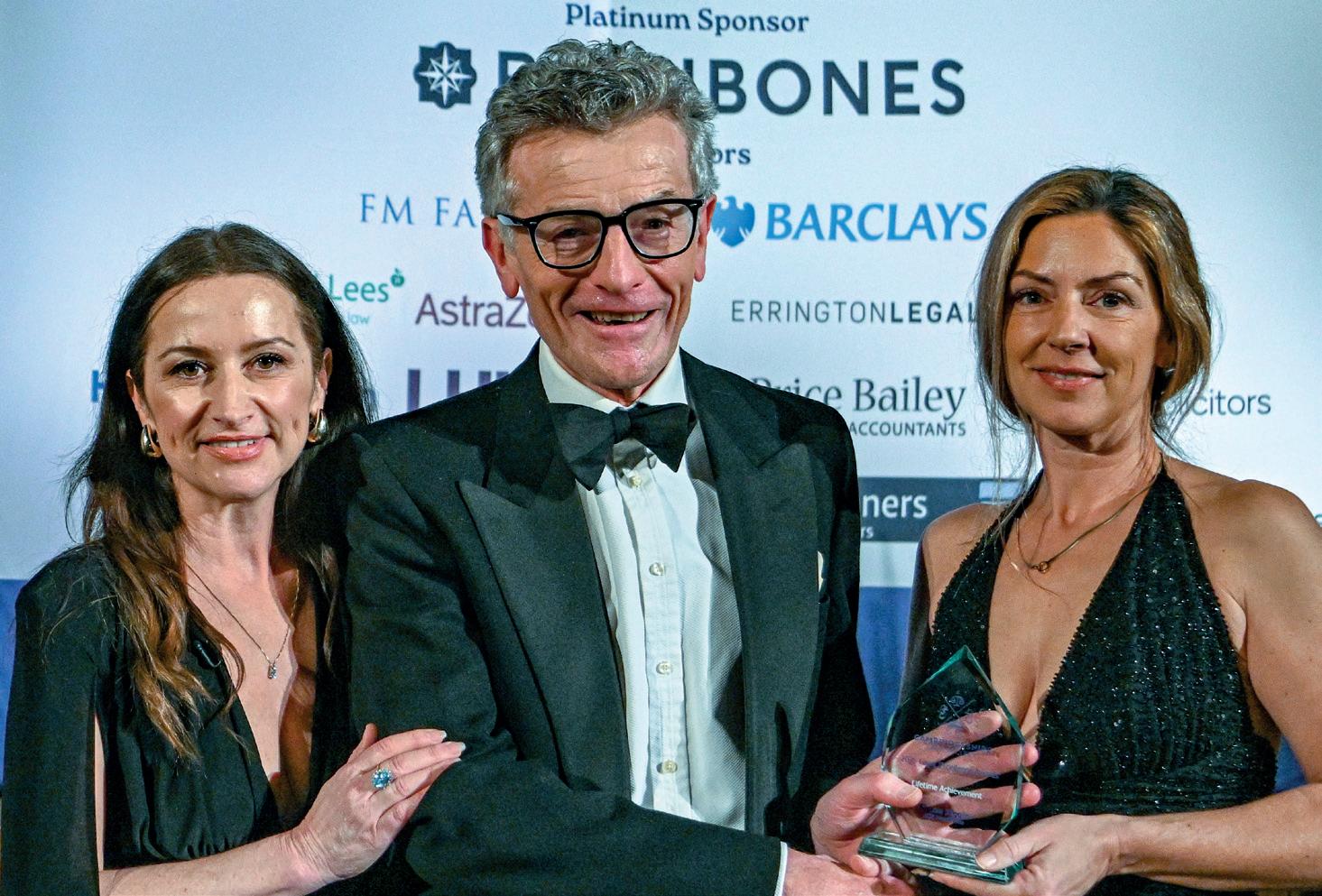
ask a colleague. If you feel you’ve made a mistake, above all, tell Compliance because, in my experience, many mistakes can be rectified.
Don’t lose sight of the trust and confidence that a client reposes in you especially in make or break matters where say a business or livelihood might be at stake. Being a good dispute resolution lawyer is a vocation, not a 9-to-5 job: you need to go the extra mile, be a problem solver, combine negative advice with a Plan B, empathise but manage expectations and where possible steer disputes to resolution. Trials are generally a two-horse race with a winner and a loser. With these qualities you will have the confidence of clients and colleagues and plentiful work.
As a dispute resolution lawyer, be adaptable and willing to venture out of your comfort zone. If say you resolve a weighty shareholders’ dispute, you cannot wait until the next one arrives because it might be a long wait or never arrive. Having focussed primarily on commercial disputes, ten or so years ago, I was introduced to public law disputes, initially judicial review challenges but going on to specialise in water abstraction appeals for farmers and growers who without irrigation water would go out of business. This specialism not only involved habitats legislation but gaining an understanding of ecology, hydrology and computer modelling. It
was challenging and interesting work but, above all, rewarding in terms of the successful outcome achieved.
Be a team player: over the years at HCR Hewitsons, I have been fortunate to be part of truly professional and supportive dispute resolution teams. I have seen lawyers operate in a silo, leaving no legacy but, I retired as a partner with a good team in place; a small legacy perhaps but significant to me. Being a team player is a twoway process: as an older lawyer, take time with young lawyers to share your knowledge and experience, to build up their confidence so that they can fly solo. In return, you can take holidays and time off for significant events and occasions in the knowledge that you have the support of your team.
And finally, what next? First, a reflection: I feel very fortunate to have had an interesting and rewarding career so much so, I remain working as a consultant! I am though an accredited mediator and I aim to transition from client work to offering a value for money mediation service. This will avoid the main issue with retirement being, you can never take a day off! Outside the office, I am a trustee of Jesus Green Lido; in addition to promoting swimming, we are committed to preserving and enhancing the Lido for future generations of swimmers. When not swimming, I can be seen on a road bike.
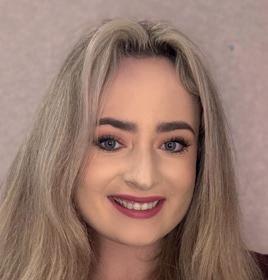
ForEbony Flack Vice President of the CJLD Paralegal, Ward Gethin Archer
anyone unfamiliar with the CJLD, we are a vibrant network of junior legal professionals comprising aspiring lawyers, legal secretaries, paralegals, trainees and NQs. We run monthly events and present a variety of networking opportunities so there is something for everyone!
We kicked off the New Year with our usual “welcome back” drinks in January, allowing returning attendees and Committee to catch up and a good opportunity for introductions amongst new faces before introducing more competitive activities!
It’s been key to strike a balance between activities that have been popular in the past such as bowling and Cork & Canvas and keeping a keen eye on new activities popping up in Cambridge to keep our events list fresh. For example, in March, we went to Boom Battle Bar to test our aim in axe throwing and for our latest event
It has been a successful start for the Cambridgeshire Junior Lawyers Division’s 2025 Committee, seeing a healthy number of membership renewals and attendees.
we had a delicious evening chocolate tasting with Chocolat Chocolat, kindly hosted by Ashtons Legal.
We have many more exciting events lined up for the year, so make sure to stay in touch with us! To join our mailing list or enquire about memberships, please visit our website www.cambsjld. org or reach out to us at cambsjld@ gmail.com. We will be offering half year memberships from June.
Now, for our most anticipated event of the year… Our Annual Charity Ball hosted with our friends over at CYPG will be hosted on Saturday 20 September 2025. This will be held at the Hilton again this year and the theme is a night

ToAbigail Reynolds Associate, Chartered Legal Executive Mishcon de Reya LLP
celebrate the beginning of summer (in theory!), the Cambridge Young Professionals Group (CYPG) hosted its annual BBQ at The Granta in Cambridge on 22 May 2025. This event offered a fantastic opportunity for networking and socialising in a relaxed and friendly setting. The Granta, renowned for its picturesque riverside location, provided the perfect backdrop. We were thrilled to welcome many faces (both new and old) who joined us to enjoy some BBQ favourites (and a few drinks!). We were even lucky enough for the sun to make an appearance!
at the casino. Further details to follow via our mailing list and social media but make sure to mark your calendar! We are raising funds for Cambridge City Foodbank again this year, it’s a great cause and we hope to see you there!
Finally, it is with huge thanks as always to Errington Legal Recruitment, our fantastic sponsor, for their continued support of the CJLD. No matter which stage you are in your legal career, get in touch with them at www.erringtonlegal. co.uk and secure your next step!

Looking ahead, we have invited everyone to take a break, unwind, and enjoy a feel-good session of yoga—with puppies! Yes, you read that right— puppy yoga will be held on 3 July 2025 at the Mill Road Community Centre. This event has already proven to be incredibly popular, so please let the committee know if you would like us to arrange another puppy yoga session in the future. It's a wonderful way to destress and connect with others – and obviously exceedingly cute!
Finally, we are pleased to announce that the Cambridge Young Professionals Group, in collaboration with the Cambridgeshire Junior Lawyers Division Society, will host the Annual Charity Ball on 20 September 2025 at the Hilton, Cambridge City Centre. This year's theme
is 'A Night at the Casino', offering a fantastic opportunity to get glammed up, let your hair down, and, most importantly, raise money for charity. The chosen charities for this year are the Cambridge City Foodbank and the Addenbrooke's Charitable Trust, both of which do incredible work in our community. Save the date, and keep an eye out for further information as we get closer to the event.
If you aren't already on our mailing list, we encourage you to sign up at cypg.co.uk to ensure you don't miss out on any of our great events. Joining the mailing list is the best way to stay informed about upcoming activities and opportunities to connect with other professionals in Cambridge. We look forward to seeing you at our future events!

Scott Smith EDI Officer Senior Associate, Thomson Webb & Corfield LLP
The very first openly LGBT judge appointed in England and Wales was the Right Honourable Lord Justice Fulford who was appointed as a Recorder of the Crown Court in 1995. At a time before civil partnerships or same sex marriage, Lord Justice Fulford has spoken of the pressures at that time of conforming with heterosexual norms amongst his fellow judges. Despite the challenges, he went on to become the second ever openly gay High Court judge in 2002 and a judge in the Court of Appeal in 2013. Now retired, Lord Justice Fulford has declared publicly that he hopes that he has left a legacy for those who have entered the judiciary after him, and as part of his retirement speech he said…
“If history determines that I have done only one thing of value, I hope that it is that I contributed to an environment in which barristers and solicitors who were not necessarily suited and booted in the classic mode, who did not fit the traditional stereotype by way of their background and lifestyle, have been able throughout their careers to be honest about themselves, and haven’t felt the need to pretend at any stage to be someone they are not. If I have at least helped by the way I have lived my life, professionally and personally, to bring about that change, for me this will have been an accomplishment far greater than anything I could ever have hoped for when I qualified back in the very different and infinitely more hostile world of 1978.”
Another openly gay man was beginning his career in the judiciary around the same time and it was the Right Honourable Lord Etherton who would became the first openly gay High Court judge in 2001, one year before
June marks Pride Month and this issue, we take a look at some LGBT pioneers who made history as the first openly gay and trans judges in England and Wales.
Lord Justice Fulford was appointed to the same role. Lord Etherton had a long and illustrious career, becoming chairman of the Law Commission in 2006, a judge in the Court of Appeal in 2008, Chancellor of the High Court in 2013 and Master of the Rolls in 2016.
However, perhaps more famous than his success, was his involvement in the legal challenge to the constitutional basis for triggering Article 50 as part of the Brexit process. He was one of the three High Court judges pictured on the infamous “Enemies of the People” Daily Mail front page story. He is also known for his work leading an independent review of the historic treatment of LGBT+ military personnel in the period between 1967 and 2000.
Lord Etherton has left a legacy behind him and has been quoted as saying that he hoped living a “totally open and honest life as a gay man in a court setting” would inspire others. Sadly, he passed away in May this year.
Dr Victoria McCloud became the first openly trans High Court Judge in 2010 having been a deputy for the prior 4 years. Not only was Dr McCloud, the first openly transgender High Court Judge, she would also become the youngest ever to take on the role at the time. She has presided over a number of high profile cases, including those considering free speech, human rights and Parliamentary Privilege.
Dr McCloud has done important work through her writing, having edited the White Book since 2000 and authored the first five editions of the Civil Procedure Handbook under her maiden name Victoria Williams.
Dr McCloud resigned from her role as a judge in February 2024 stating that she had “reached the conclusion that in 2024 the national situation and present judicial framework is no longer such that it is possible in a dignified way to be both 'trans' and a salaried, fairly prominent judge in the UK". She has since been a public advocate for trans rights having also sought leave to join the recent litigation in the Supreme Court case For Women Scotland Ltd v The Scottish Ministers.
DESPITE THESE PIONEERS, LGBT+ REPRESENTATION IN THE JUDICIARY REMAINS LOW, PARTICULARLY IN THE SENIOR COURTS. WHILST PROGRESS IS BEING MADE, THERE IS CLEARLY STILL WORK TO BE DONE.
Despite these pioneers, LGBT+ representation in the judiciary remains low, particularly in the senior courts. Whilst progress is being made, there is clearly still work to be done to achieve equity for those in the LGBT+ community within the judiciary.
If you would like to contribute towards our Diversity Matters series, or have ideas for events our Diversity Network could run, please reach out to our EDI Officer, Scott Smith at ssmith@twclaw.co.uk

Olga Kyriakoudi Trainee Solicitor, Greene & Greene
The SQE has two stages: SQE1 and SQE2. SQE1 is made up of two papers, Functioning Legal Knowledge (FLK) 1 and FLK 2. Each paper covers subjects that fall into two groups: underlying law and substantive law.
Underlying law includes subjects that are commonly studied at undergraduate level. These include Tort, Contract, Trusts, Criminal, Public and Land law. Candidates are expected to have prior knowledge of these topics, and so they are usually revised independently rather than taught in full. Some providers may offer light coverage or support, but most expect students to prepare these areas independently.
Substantive law includes Business Law and Practice, Property and Practice, Dispute Resolution, Wills and Administration of Estates and Criminal Litigation and Procedure. These subjects are covered in SQE preparation courses, which can be taken on a fulltime or part-time basis.
The SQE1 assessments take place over two days. Each paper is three to five hours long long and includes 180 Single Best Answer Questions (SBAQs), also known as Multiple-Choice Questions (MCQs). Candidates are given five options per question. Not all options are incorrect, but only one is the best answer. The current pass rate for first-time SQE1 candidates is around 60 per cent.
As someone preparing to sit the SQE1 this July, I understand the overwhelming amount of content that needs to be covered. This article shares a selection of study strategies and revision techniques to support SQE candidates on their journey.
Every person learns differently. It is important to find your learning style. There are quick online quizzes that can help determine whether you retain information best by reading, listening, seeing or doing.
The Solicitors Qualifying Examination (SQE), which replaced the Legal Practice Course (LPC) in September 2021, is now the main route to qualification for aspiring solicitors in England and Wales.
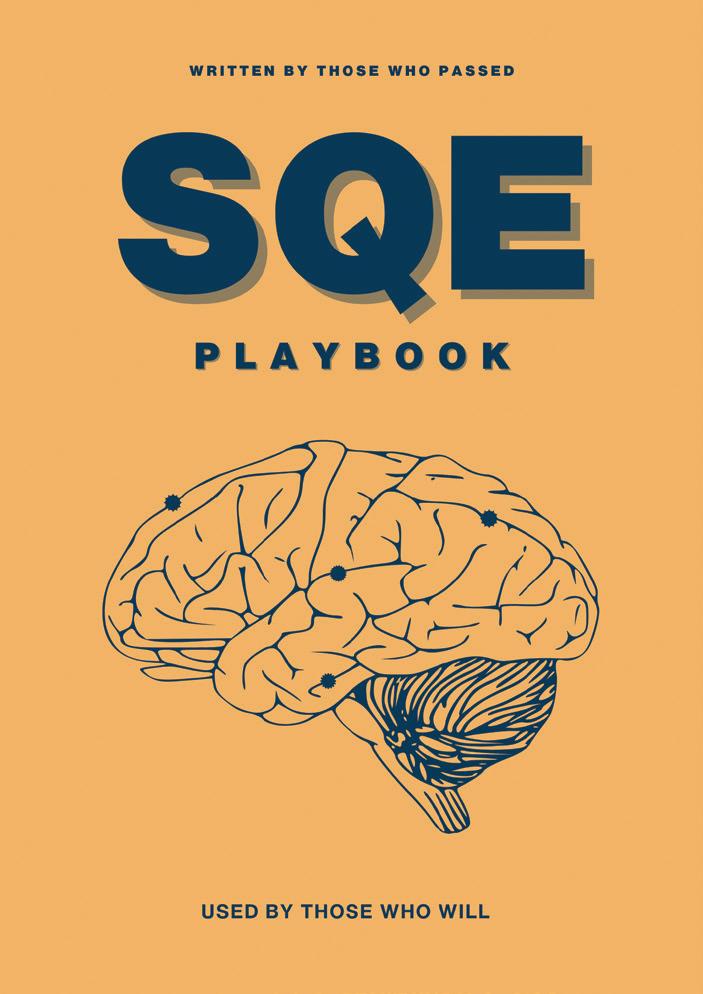
To increase transparency around SQE preparation, BPP Law Society Cambridge created a student-led project called SQE Playbook. The SQE Playbook showcases testimonials from students who have successfully passed SQE1, where they reflect on their experiences and share the preparation techniques that helped them succeed. It also serves as a platform to recognise and celebrate student success.
Useful revision tips shared in the Playbook include creating podcasts from revision notes, using flashcards, and drawing mind maps. Many students highlight SBAQs as the most effective method for testing knowledge and reinforcing memory. If you want to learn more about the project, please visit our LinkedIn page
A solid study environment also plays a big part. Whether you study at home or in a library, your space should be organised and distraction-free. Apps like Forest can limit phone use during study time and help keep you focused.
You should also make full use of your course materials. If your provider
gives you a checklist, use it to monitor progress. If not, copy the SQE syllabus into a Word or Excel document and tick off topics as you study them.
Some SQE Playbook testimonials recommend creating spreadsheets listing all subjects and rating how confident they feel in each one. This can highlight weaker areas that need more attention closer to the exam.
Mock exams and timed practice are essential. Internal tests allow you to work under exam conditions and receive feedback. If your provider does not offer these, use SQE sample questions from the official website and mark them yourself. The SQE website also offers a demonstration of the exam, which includes sample questions and a realistic user interface.
Flexibility is also vital. If you work or have other commitments, your study plans might change. Try to stay consistent even if you cannot follow your exact schedule.
Mental health must not be overlooked. SQE preparation is intense and long. Research shows that a clear and focused mind can improve both learning and memory. It is therefore important to rest, take breaks and look after yourself, especially during the revision period leading up to the exam.
Lastly, remember that failure does not define you. These exams are challenging and getting this far is an achievement in itself. There is no shame in resitting. Treat failure as a detour, not a dead-end street.
To all candidates preparing for the SQE, whether sitting the exams this July or later, we wish you the very best of luck!
The next article will explore the experience of sitting the SQE 1 and receiving results, two important yet often nerve-racking topics.

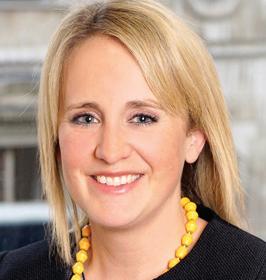
Kate Harris Editor, Partner Birketts LLP
Buckles Law Corporate team deliver on an Employee Ownership Trust
Collaborating with TC Group, the team helped to facilitate an Employee Ownership Trust (EOT) transaction for Cambridge Support Ltd, an awardwinning IT support company with over 30 years of bespoke experience, specialising in managed IT support, consultancy, cloud migration, Microsoft Teams, and network support.
Moving to an Employee Ownership Trust allowed 100% of the company shares to be sold for the benefit of all employees, aligning with the company’s people-first culture, whilst providing an exit route for existing shareholders.
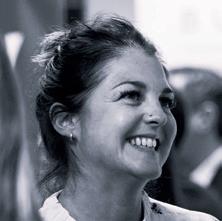
The team, led by Katy Poole, provided essential legal advice throughout the EOT transaction, ensuring compliance with relevant regulations and maximising financial efficiency. The successful completion of the EOT transaction not only safeguarded the company’s culture, but it also empowered employees, giving them ownership of the business. The move made by Cambridgeshire Support Ltd reinforced customers’ trust and confidence, setting them apart in a crowded market.
Greenwoods advises Hawkins on strategic expansion
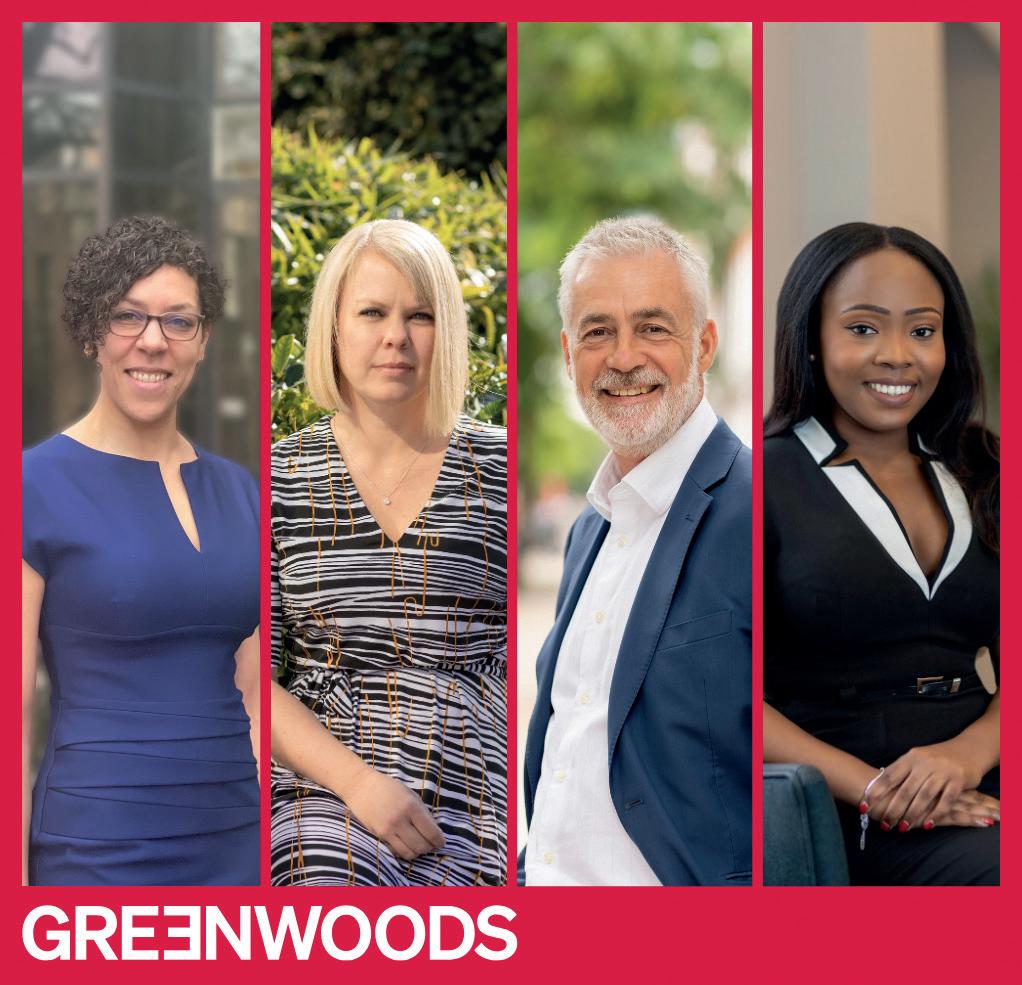
The Corporate & Commercial Team were delighted to have acted for Hawkins & Associates on their acquisition of two established quantity
We are continuing to celebrate the successes of our member firms and to bring you news of the biggest deals and wins from across the County. Here’s what’s been going on this quarter…
surveyor businesses: A. Lamb Associates Limited and its subsidiary Morham & Brotchie Limited.
Hawkins was established in Cambridge in 1980 and has grown to have a global presence with offices in Dubai, Hong Kong and Singapore, and in key locations across the UK & Ireland. By combining strengths and expertise, the acquisition builds on Hawkins’ capabilities and services as they can now provide both technical and quantum and delay on the same case, giving clients unparallelled service in the market. Greenwoods is proud to have supported Hawkins in this stage of their ongoing and ambitious growth journey.
Alex Chambers, Finance Director, Hawkins, said “It has been a pleasure working with the Greenwoods team on this project from initial inception through to completion… the team has been both pragmatic and diligent whilst doing their upmost to ensure the deadlines were met for the benefit of our employee shareholders.”
Mills & Reeve’s Life Sciences Team advise Tessellate Bio on their collaboration with Boehringer Ingelheim in developing cancer treatments
The team advised Tessellate Bio, a precision oncology company specialising in novel synthetic lethality approaches, on its research collaboration and global licence agreement with Boehringer Ingelheim, aiming to develop firstin-class, oral precision treatments for people living with hard-to-treat cancer.
Under the terms of the agreement, Tessellate Bio will receive near-term payments including an upfront licence fee, research funding, and technical milestone payments, as well as downstream success-based milestones, with an overall deal value in excess of €500 million.
Lara Boyd, chief business officer at Tessellate Bio, commented: “As Tessellate Bio’s first pharma deal, this was a big milestone for us, and it was important to have the support of external counsel who not only give solid legal
guidance but also deeply understand the commercial sensitivities on both sides of the negotiation table. Having worked with James Fry and the team at Mills & Reeve on a range of transactions over the years, I knew they were the right team to engage. Their client service really stands out - they’re responsive, thoughtful, and easy to work with.”

James Fry, head of life sciences at Mills & Reeve, added: “This collaboration marks significant advancement in cancer research, addressing one of the most pressing challenges in medicine today. I’m proud to have supported Tessellate Bio in forging this groundbreaking partnership with Boehringer Ingelheim.”
Cambridge law firm moves to new offices and celebrates 10 years in the city
Howes Percival has moved to new premises to house its rapidly growing team marking the 10th anniversary of its Cambridge office. To accommodate the growing team, the firm has taken over a new space on the first floor of Terrington House, following a bespoke refurbishment.
Cambridge Partner Matthew Potter commented, “We have successfully built teams in Cambridge offering a complete client service over the full spectrum of commercial and private client services. The plan is to keep growing in Cambridge, recruiting the best people and delivering a genuine client focused service. The new offices afford staff the best possible working environment, whilst also giving us the space we need to keep on investing in growth, people and the services we offer to the city and the eastern region.”

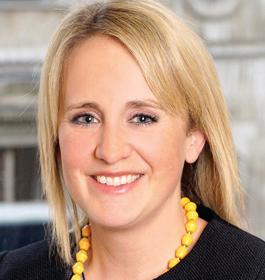
Kate Harris Editor, Partner Birketts LLP
Here is a round-up of the latest moves, promotions and achievements of Cambridgeshire Law Society’s members…
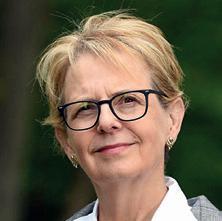
Ashtons Legal expand its Planning Law Team
Claire Barritt has joined Ashtons Legal’s Planning Team as a Senior Associate in the Planning Law team. Claire specialises in planning law, commercial property, and public sector governance and drafts and negotiates a wide range of planning and infrastructure agreements for her clients.
Claire previously had a long career in the public sector, including as the Head of Legal and Democratic Services and Corporate Services for an urban authority, before joining private practice in 2015. She has lectured at the University Campus, Colchester and is a charity trustee for 4YP, a Suffolk-based charity that provides wellbeing services to young people.
Solicitor joins specialist boutique family law firm, FM Family Law.

Yazmine Lane specialises in all aspects of private family law and completed her training contract at a boutique London firm. With a strong foundation in place from her time in London, Yazmine is excited to now be building her practice and developing her network in Cambridge. Yazmine brings the number of specialist family lawyers across the firm to 10.
Greenwoods Legal LLP welcomes Commercial Real Estate Partner
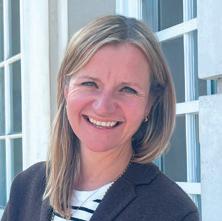
Emma Roche has joined Greenwoods Legal LLP as a new Commercial Real Estate partner, bringing standout
corporate occupier experience. Emma is recognised in the Legal 500, and as a qualified business coach to in-house lawyers, she offers rare insight into the challenges corporate legal teams face enabling her to anticipate client needs and deliver practical, strategic advice that gets deals done.
Emma’s energy and perspective align perfectly with the real estate team’s ambitious five-year plan to become a destination practice of choice, and she says “Greenwoods’ modern, techdriven approach and real investment in its people really stood out. I’m excited to join a firm that’s bold, collaborative, and refreshingly different.”
New Partner in Birketts’ Employment Team

In April, Birketts promoted five lawyers to the firm’s partnership, including Olivia Toulson in its Cambridge office. Olivia qualified as a Solicitor in 2005 and is a Partner in the Employment Team and Co-Head of Financial Services. She predominantly acts for clients in the financial services, technology and independent healthcare sectors.
Olivia has considerable experience handling employment tribunal litigation for employers, having worked on many complex, multi-day claims involving unfair dismissal, discrimination, whistleblowing, breach of contract and unlawful deductions from wages. She has advised on matters in the employment tribunal, Employment Appeal Tribunal and Court of Appeal.
Commenting on the promotions, Chris Schwer, Senior Partner, added: “I’d like to congratulate our newly promoted partners, who will continue to contribute to Birketts’ ongoing success. I wish them all the best as they progress their careers at the firm and am very much looking
forward to seeing them develop further as members of the Partnership.”
Howes Percival adds to its Partnership

Victoria Sandell has been promoted to Partner in the Dispute Resolution & Insolvency Team. She is a highly regarded lawyer with extensive experience advising on a broad range of complex commercial disputes. Her expertise includes contractual and shareholder disputes, professional negligence claims, fraud and cyber fraud matters, judicial reviews, and insolvency proceedings. She is also well-versed in contentious trusts and probate matters.
Victoria’s expertise spans both County Court and High Court litigation, and her excellent track record was recently recognised when she was named ‘Senior Lawyer of the Year’ at the Cambridgeshire Law Society’s Legal Excellence Awards 2025, an accolade that reflects both her legal acumen and her commitment to excellence. This promotion underlines Howes Percival’s ongoing commitment to recognising and advancing talent from within, as the firm continues to expand its presence.

The Family Team has also recruited Partner, Ben Twitchen into its rapidly growing Cambridge office. Ben’s appointment follows the arrival of Partner Chris AllenJones in December, as the firm looks to significantly increase its family law practice in the city.
With over two decades of experience working in family law, Ben specialises in dividing assets on divorce, as well as child arrangements, prenuptial agreements and injunctions. He has been an accredited Collaborative Lawyer since 2006 and his pragmatic approach is based on guiding clients
to an early amicable outcome where possible, minimising the costs and stresses of the legal process. He is an accredited mentor for Resolution, a national organisation of family lawyers and other professionals committed to the constructive resolution of family disputes, providing support for the next generation of advisers.
Effective from 1 June 2025, Mills & Reeve have promoted 4 Partners in the Cambridge office. Senior partner, Charles Staveley, commented: “I’m really pleased to see so many of our principal associates advancing to partner this year. As a firm, we’re dedicated to investing in the development of our people, enabling them to reach their full potential and progress to the next level. These promotions are a testament to that commitment, and to the hard work of the lawyers themselves.”
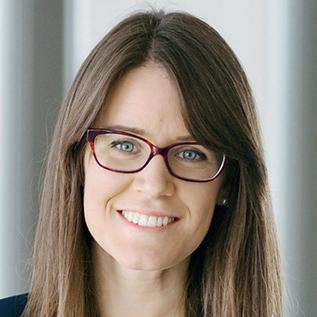
Ania Tarasiewicz is a specialist family lawyer and mediator advising on all aspects of family law, particularly involving complex business cases in the agribusiness sector and cases with international aspects. She works with a wide range of clients, from business owners and industry-leading professionals to international families. Ania will continue to drive the growth of the firm’s top-ranked family law practice.
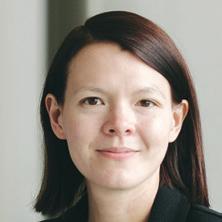
Emma Plaxton is a corporate lawyer, supporting clients on a wide range of general corporate work, with a particular expertise in acting for listed companies. She works with a diverse range of businesses across different sectors. Emma will support the growth of the firm’s equity capital markets practice.

Edward Freeman is a construction lawyer with a particular expertise in complex transactions, especially in the areas of senior living, retail, residential and regeneration.

Rebecca Cockerill is a commercial employment lawyer, advising private sector clients on the full range of employment and people issues. She will be supporting the growth of the firm’s employment law practice, with particular focus on the East of England.

The firm have also recruited Corporate Partner, James Foster, from Wilson Sonsini, one of the world’s leading global technology and life sciences firms. James brings with him extensive experience in managing high-value M&A transactions for large global businesses.
James’ arrival will further strengthen Mills & Reeve’s presence in the Golden Triangle, the life sciences and technology innovation supercluster encompassing London, Oxford, and Cambridge. With offices in all three cities, the team is ideally positioned to support clients operating within this dynamic region.
Stephen Hamilton, partner and joint head of the corporate team, commented: “We’re very excited about James joining us. He has a strong track record in delivering major corporate transactions for leading global technology and life sciences businesses, and we see this as a real step forward for us in developing the practice.”
James added: “Joining Mills & Reeve is an exciting step for me. The firm has a fantastic reputation for advising key players in all areas of the technology and life sciences ecosystems. I am delighted to join the team to support innovative and ambitious businesses as they scale and undertake transformative transactions.”
Finally, Helena Oxley joins the firm as a Senior Associate in the Employment, Pensions and Immigration Team and thirteen new interns join the summer vacation scheme in June.
Woodfines announces new chapter with Managing Partner appointment Woodfines Solicitors is thrilled to announce the appointment of Suzanna Stephenson as its new Managing Partner.
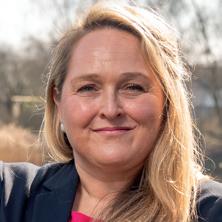
Suzanna, took over the role from Neil Gibbs and takes on responsibility for the firm's continued evolution and growth across the Oxford to Cambridge Growth Corridor. She will be working closely with all stakeholders to deliver the next phase of the firm's proactive strategy.
Suzanna is a Commercial Property specialist who joined Woodfines in 2014, rising to head of the property team in 2020. She is dedicated to working collaboratively with colleagues to drive the business forward and is recognised for her tenacity and strong business insight.
Suzanna comments: "I'm honoured and excited to be taking on this new challenge. I will work with our talented people to ensure that Woodfines continues to serve its clients with the highest level of service and excellence. Woodfines has seen positive change under the leadership of Neil, and I would like to thank him for his dedication and for the solid foundation he has built over the past six years."

Fenners Chambers welcomes new Family Law Barrister Jonathan Walker Kane specialises in matrimonial finance, TOLATA claims arising out of cohabiting relationships and claims brought under the Inheritance (Provision for Family and Dependants) Act 1975. He is instructed nationwide and is a regular speaker at family law events for Jordans, the Family Law Bar Association, The Solicitor’s Group, and Cambridge University.
Jonathan has acted in cases of significant complexity, including the Court of Appeal case of Cordle v Cordle He also appeared in Frear v Frear, an Inheritance Act appeal.
Well-regarded for both his distinctive court style and sensitive client care, Jonathan brings valuable expertise and experience to the Family team at Fenners.

Cambridgeshire Law Society (CLS) held its flagship annual Gala Dinner and Legal Excellence Awards on Thursday, 27 March 2025 at King’s College, Cambridge and over 200 guests attended.
The Legal Excellence Awards celebrate the collective and individual successes of CLS’ members, categories include firm awards, team awards and individual awards.
Fiona McLeman, Vice-President of CLS, hosted the event and presented the awards together with the event’s generous sponsors, including Mark Winchester from Rathbones Wealth Management (the Platinum Sponsor). Sarah Crick, CEO of the Red Hen Project spoke at the event and a charity raffle took place to raise money for the Red Hen Project.
A special mention goes to Simon Biggin from HCR Hewitsons, who was presented with the most prestigious award of the night, the Lifetime Achievement Award. Simon has contributed significantly to the legal community in Cambridge and thoroughly deserves this recognition.
Fiona commented: “It is always a pleasure to celebrate the outstanding achievements of the legal profession in Cambridgeshire over the last 12 months and this year was no exception. It was a fantastic event, held at the prestigious King’s College, Cambridge. I was particularly pleased that we were also able to raise a substantial amount of money for the Red Hen Project, which is a local charity supporting children and their families. I also want to thank our generous sponsors especially Rathbones Wealth Management and our members without whom there would be no CLS.”


For more information about CLS or for details of next year’s Legal Excellence Awards please contact admin@cambslaw.com, or follow CLS on LinkedIn, X @cambslaw, or on Facebook and Instagram @cambslawsoc
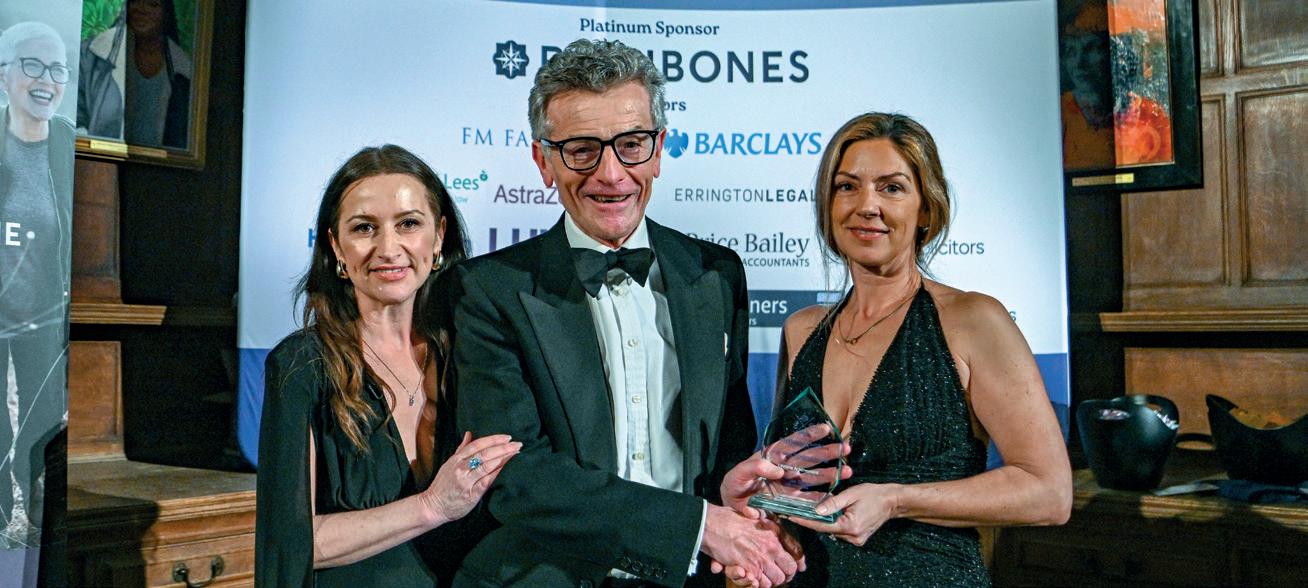
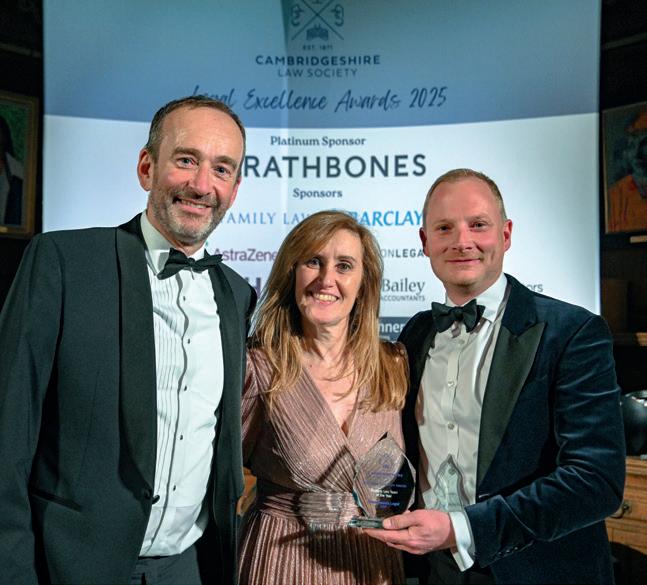
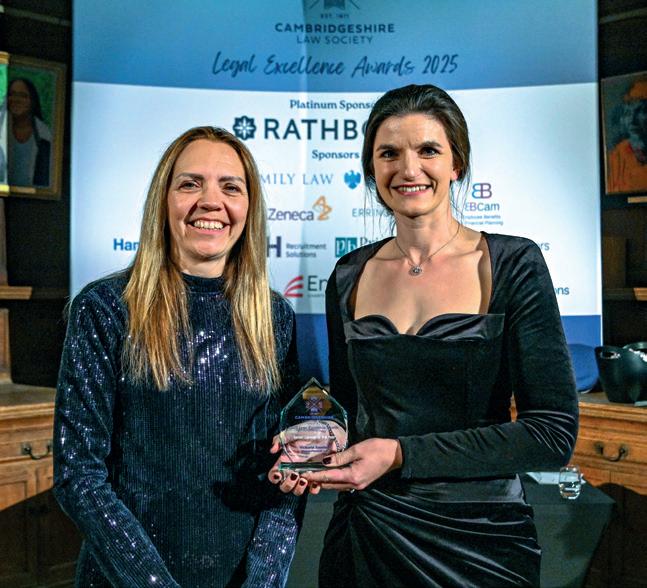
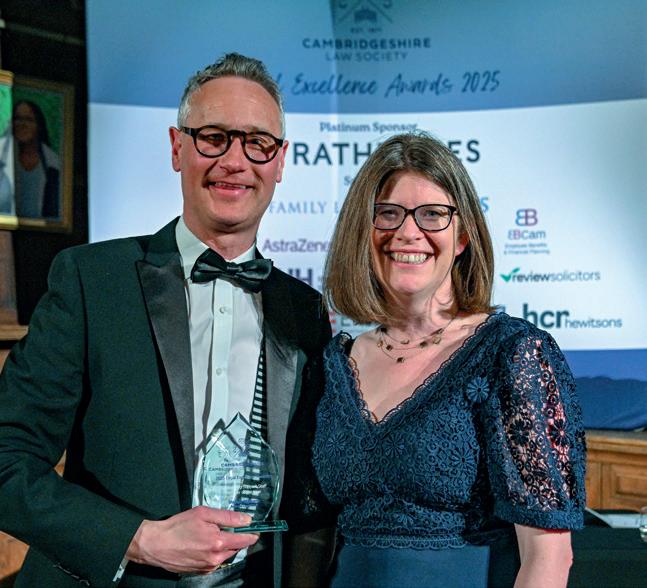
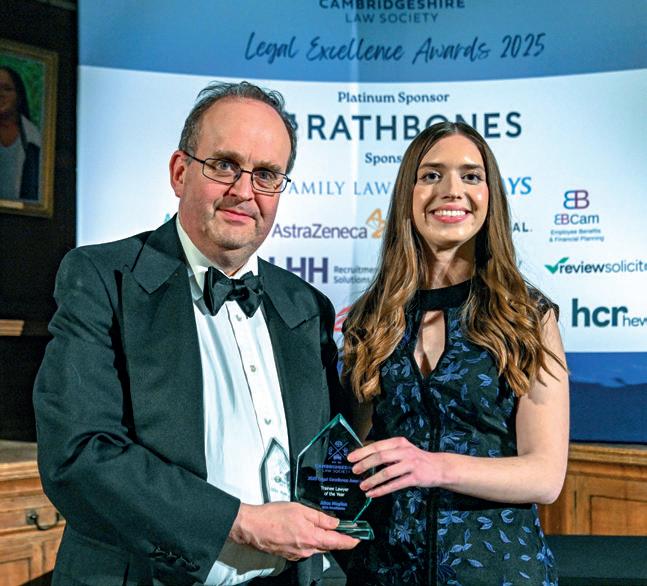

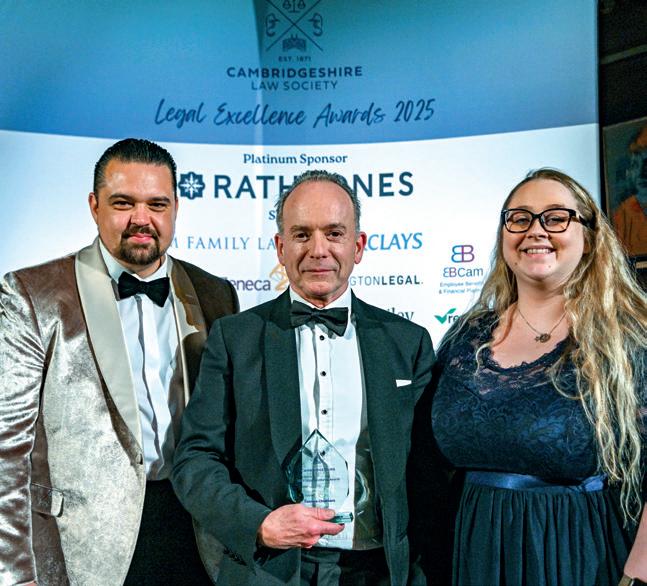
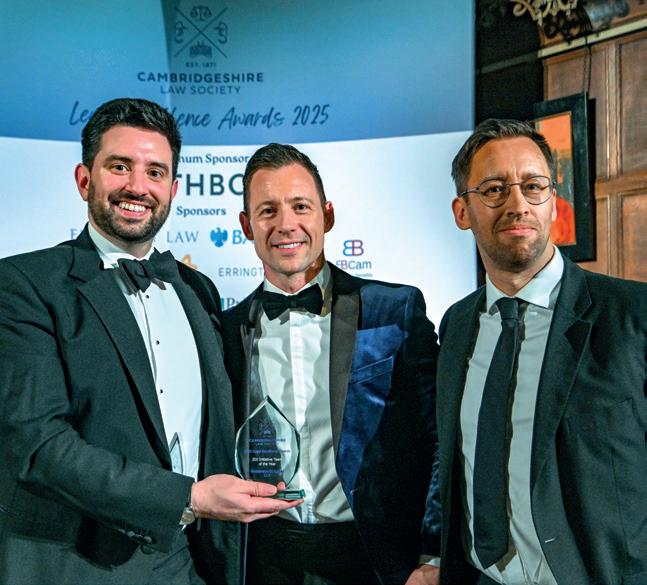








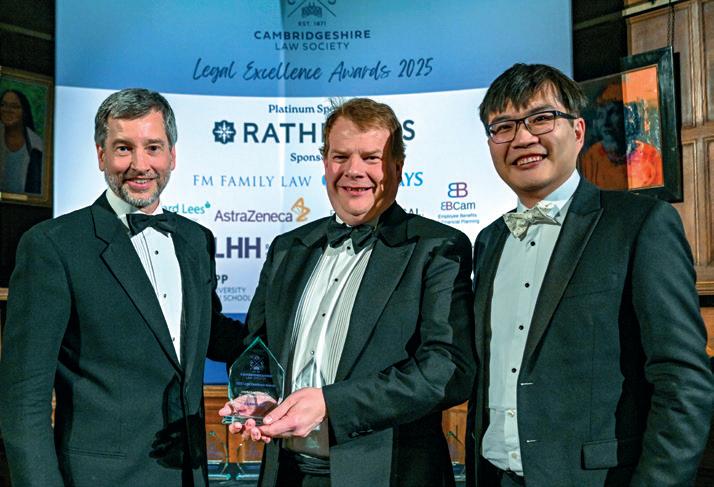
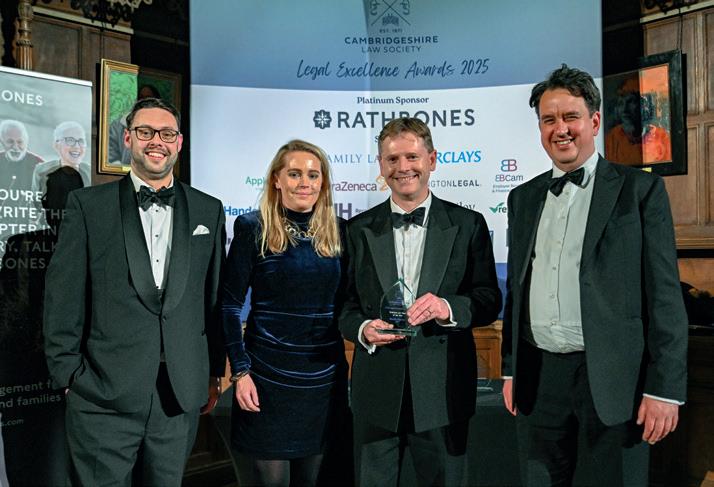
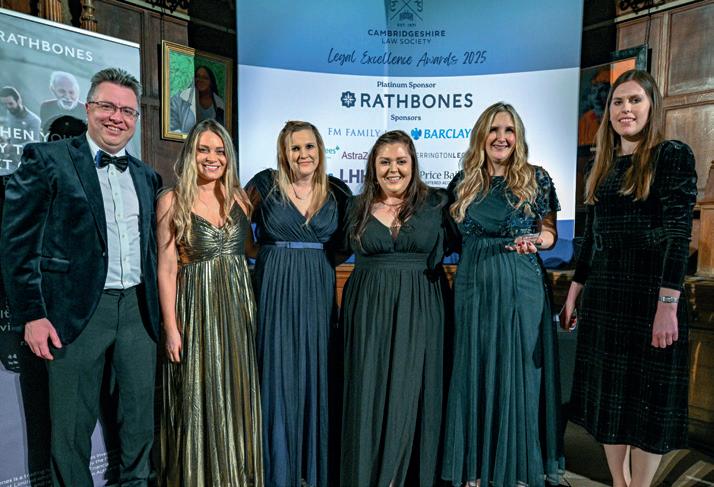
★ LIFETIME ACHIEVEMENT AWARD sponsored by FM Family Law
SIMON BIGGIN HCR HEWITSONS
★ PROPERTY TEAM OF THE YEAR sponsored by Handelsbanken
GREENWOODS LEGAL LLP
Highly commended: Simmons & Simmons LLP and Tees Law
★ BUSINESS LAW TEAM OF THE YEAR sponsored by Errington Legal
HOWES PERCIVAL LLP
Highly commended: Birketts LLP and HCR Hewitsons
★ PRIVATE CLIENT SERVICES TEAM OF THE YEAR sponsored by EBCam
BUCKLES SOLICITORS LLP – FAMILY TEAM
Highly commended: FM Family Law and HCR Hewitsons



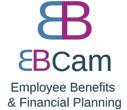





James Allen, President of Cambridgeshire Law Society

I was sorry to have missed the Legal Excellence Awards Dinner but I have received some great reports of the evening. I am also really pleased to report that we raised the sum of £6,000 for the evening's charity, The Red Hen Project. Thank you all for your generosity in connection with a charity that is close to my heart for a number of reasons. I hope that raffle winners all enjoyed your prizes and look forward to seeing you next year at the Legal Excellence Awards at Queens’ College on Friday 17 April 2026.
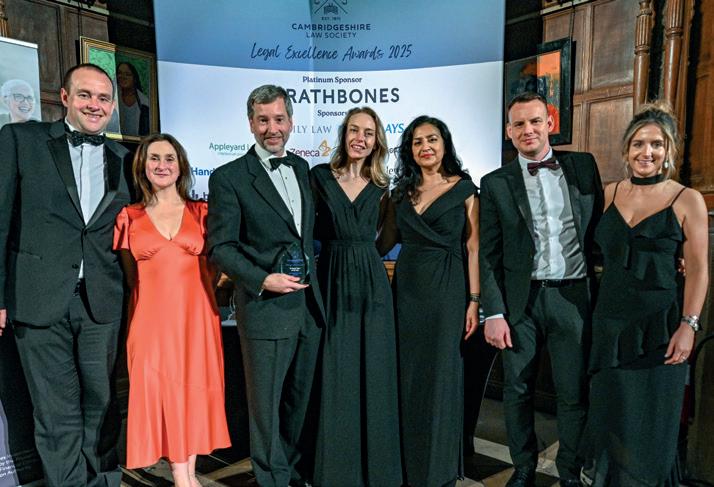
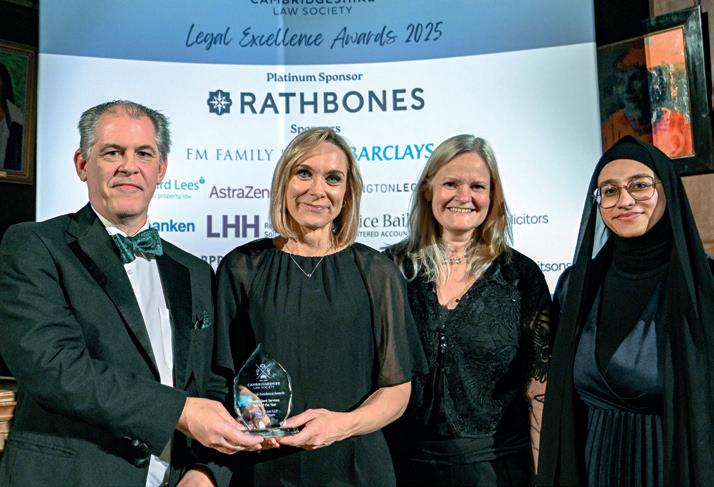


★ IN HOUSE TEAM OF THE YEAR sponsored by LHH Recruitment Solutions ASTRAZENECA UK LIMITED
★ LITIGATION TEAM OF THE YEAR sponsored by Price Bailey LLP
ASHTONS LEGAL LLP
Highly commended: Slater & Gordon UK Limited and HCR Hewitsons
★ INTELLECTUAL PROPERTY/IT TEAM OF THE YEAR sponsored by AstraZeneca UK Limited
J A KEMP LLP
Highly commended: Appleyard Lees IP LLP and Keltie LLP
★ EDI INITIATIVE TEAM OF THE YEAR sponsored by Appleyard Lees IP LLP
GREENWOODS LEGAL LLP
Highly commended: Buckles Solicitors LLP –Family Team and Simmons & Simmons LLP
★ CRIMINAL LAW TEAM OF THE YEAR sponsored by Review Solicitors
FENNERS CHAMBERS
Highly commended: Shelley & Co
★ LAW FIRM OF THE YEAR sponsored by Barclays HCR HEWITSONS

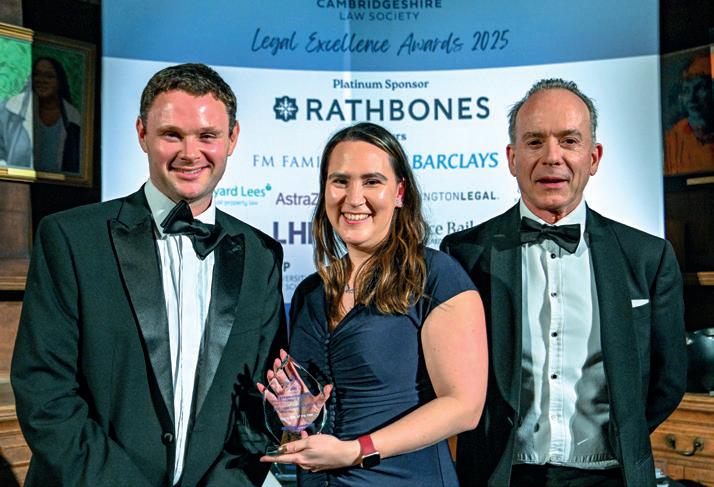
★ TRAINEE LAWYER OF THE YEAR sponsored by BPP
ALICE MOYLAN HCR HEWITSONS
Highly commended: Emily Walden, Irwin Mithcell LLP and William Hall, HCR Hewitsons
★ RISING STAR OF THE YEAR sponsored by Fenners Chambers
JONATHAN GOODACRE KELTIE LLP
Highly commended: Evelyne Tseng-Shields, Cambridge University Press & Assessment and Caitlin Levins, FM Family Law
★ SENIOR LAWYER OF THE YEAR sponsored by HCR Hewitsons
VICTORIA SANDELL HOWES PERCIVAL LLP
Highly commended: Michael Frape, Ashtons Legal LLP and Elizabeth Corke-Webster, Mills & Reeve LLP
★ OUTSTANDING SUPPORT STAFF MEMBER sponsored by Ensors
STEFAN MITHAM ASHTONS LEGAL LLP
Highly commended: Anna Krupa, HCR Hewitsons and Sharon Osborn, Keltie LLP


The impact of climate change on flood risk is becoming an increasingly pressing issue for property transactions, particularly in low-lying areas such as Fenland. Rising sea levels, extreme weather patterns, and evolving flood defence strategies all have a bearing on property due diligence. For conveyancers, understanding these risks is critical in ensuring clients are fully informed before committing to a purchase.
The changing flood landscape in Fenland Historically, the Fenlands have been highly susceptible to flooding due to their flat terrain, proximity to tidal influences, and reliance on man-made drainage systems. The Fenland Level 1 Strategic Flood Risk Assessment (SFRA) indicates that approximately 67% of the district falls within Flood Zone 3, meaning it is considered at high risk of flooding. Climate change is expected to worsen this situation, with projections suggesting that sea levels could rise by up to one metre by 2100, increasing the risk of both tidal and river flooding.
In addition to rising water levels, changes in rainfall patterns are also a significant concern. The frequency of intense rainfall events is expected to increase, leading to more occurrences of surface water flooding. Furthermore, groundwater flooding could become more common as prolonged periods of wet weather heighten soil saturation levels. These factors, coupled with the natural subsidence of Fenland peat soils, pose a growing challenge for property developers and homeowners alike.
Implications for property transactions
A recent study by Geodesys revealed that 1 in 3 customers do not consider a flood report for every transaction, reasoning that property location plays a big part in their decision-making.
For conveyancers operating in the region, flood risk assessment is a crucial aspect of due diligence. The presence of flood risk can significantly impact mortgage lending, insurance premiums, and the long-term value of a property. Many lenders now require detailed flood risk reports, beyond the standard Environment Agency flood zone classifications, before approving finance on properties in high-risk areas. To ensure thorough due diligence, conveyancers should look for a full flood risk report providing a comprehensive assessment of the risk to the property.
Insurance considerations are also becoming more complex. While the UK government’s Flood Re scheme provides affordable insurance for properties at risk, it is only available for homes built before 2009. This means newbuild properties in flood-prone areas may face difficulties securing viable insurance cover, which could impact their desirability and resale value.
How conveyancers can support clients
A comprehensive approach to flood risk assessment is essential for conveyancers advising clients in Fenland.
Beyond obtaining a standard flood search, solicitors should consider climate change projections, the effectiveness of existing flood defences, and potential mitigation measures. The presence of sustainable drainage systems (SuDS), flood barriers, and raised building elevations can influence a property’s resilience against future flooding.
In addition, local government planning policies are increasingly considering climate change when approving new developments. Conveyancers should ensure that clients purchasing new properties understand any planning conditions or obligations related to flood risk mitigation. In some instances, property owners may be required to contribute to the maintenance of local flood defence schemes, which is a financial consideration for potential buyers.
Jake Hawkey, Account Partner at Landmark Information Group, comments:
"As climate change continues to reshape our environment, the property market cannot afford to overlook its long-term impact. Conveyancers and solicitors must now consider both current and future flood risk to homes and real estate. Landmark is proud to work with Geodesys to provide the foresight needed to provide comprehensive advice in a digestible way that's easy to communicate, ensuring investments are protected against the uncertainties of a changing climate."
Conclusion
As climate change increasingly alters the flood risk landscape of Fenland, conveyancers play a crucial role in informing property buyers about these associated risks. By keeping current with flood risk assessments, insurance implications, and local mitigation efforts, legal professionals can offer vital guidance that protects their clients’ investments and ensures long-term security. In an era of growing environmental uncertainty, conducting thorough due diligence in flood-prone areas has never been more crucial.
Geodesys offers a range of flood reports and combined environmental risk searches, providing conveyancers with a comprehensive understanding of flood risks to their clients and enabling them to make more informed decisions about their purchase before proceeding.
To find out more visit: www.geodesys.com.

As the Law Society of England and Wales marks two centuries* since its inception in 1825, new research** reveals public views on the legal profession, the justice system and the use of technology.
Public confidence in solicitors remains the cornerstone of the legal sector’s continued success as almost eight in 10 adults in the UK (78%) who have used a solicitor in the last five years report positive experiences.
This confidence is emphasised by the legal sector’s key role in supporting the UK economy and society with around two thirds (65%) saying legal services are important for the British economy. The legal sector’s turnover is £74.4 billion (2022) and exports £9.5 billion (2023) employing more than half a million people directly or indirectly***
While trust in legal professionals and the sector is strong, only one in six (16%) believes that the British justice system treats everyone equally** highlighting the current challenges of access to justice and fairness for all. Looking to
the future, embracing new technologies like AI presents unique opportunities to address these issues.
Around six in 10 (59%) say that being able to access their legal case on an app or online platform would make their experience of solicitors more positive, but around three-quarters (77%) do not trust AI to provide legal advice and seven in 10 (70%) don’t feel confident using online legal services without a lawyer’s guidance.With more than halfof solicitors in firms using some form of AI****, human oversight is needed to ensure consumers feel they can access legal services safely.
Our president Richard Atkinson said: "For two centuries, the Law Society has stood on the frontlines of social progress, economic development and technological innovation.
"As we honour the past, we look to the future. Public trust in the legal profession underscores the values that the Law Society has been guided by for 200 years. While there are many challenges ahead, we consider it our
duty as solicitors to do our part to improve fairness and access to justice for all.
"Our profession honours tradition yet it is open to innovative solutions that address the issues we face. We are steadfast in tackling inequality in our profession, the justice system and society by promoting diversity and equality.
"From the international law firms based in our legal hubs like London and Cardiff to the high street law firms, the legal sector is a healthy and strong industry that helps our robust economy compete internationally while strengthening local communities.
"At the same time, enhancing confidence and trust in our profession is paramount. As is integrating cuttingedge technologies to better the way we interact, do business and support people in need. The Law Society can look ahead to its next century with confidence as both a trustworthy ally and challenger of the system to which people can turn to find justice."
The Family Justice Council (FJC) has published guidance for professionals and litigants who represent themselves on the use of covert recordings in family law proceedings. The guidance follows an increased use of covert recordings in family law proceedings and the need for clear guidance, and the protection and privacy of those subject to the recording.
In summary, the guidance:
l Outlines considerations undertaken by the court, referencing relevant laws and statutory frameworks involved with covert recordings in legal proceedings – including, the covert recording of children, professionals, and other family members.
l Explores the consequences and
potential issues that may arise from the use of covert recordings in family law proceedings and provides guidance to promote consistency in the approach to these recordings.
l Emphasises the need for more guidance across professional bodies and organisations regarding the use of covert recordings in legal proceedings in the family justice system.
l Analyses key considerations of the courts when assessing covert recordings in legal proceedings, such as the authenticity and completeness of the recording, probative value, and relevance to the case.
The guidance notes that the recording of professionals, either covertly or overtly

by request, is a growing phenomenon that does not appear to be reflected in the policies of many professional agencies which serve the family court. The Council notes that, while such recording should not be necessary, there are occasions where these kinds of recordings have been demonstrated to have probative evidential value. It goes on to note, however, that there are circumstances when covert or overt recordings would undermine the validity of expert assessments, for example, in neuropsychological assessments, as it has been demonstrated to influence the quality of interaction and the performance and behaviour of persons under assessment.
USER SEAN MOSBY



The judge found that the evidence of the claimants' psychological expert, Dr A, fell well below the standard to be expected of a competent expert witness, both as to form and as to substance.
l Make sure that you understand and comply with the relevant procedural rules, practice directions and guidance, including all required statements and declarations.
l The EWI recommends that expert witnesses periodically undertake training to refresh their practice and eradicate any errors that may have crept in.
l You can also use a report best practice and compliance checklist, such as the one in the EWI Knowledge Hub, to ensure that your report is compliant.
l Always reference any sources you have relied on in forming your opinion and make sure you refamiliarise yourself with those sources as part of your preparation for any joint meetings or cross- examination.
l If you are quoting from an article or any other document, always clearly acknowledge the source of the quoted passages.
l Make clear in your report if a source you rely on represents a minority opinion or if the author has a vested interest in the acceptance of their views by the court.
l Do not include anything in your report that you would not be able to explain fully to the court.
l Make sure you are fully prepared for cross-examination. You should have at least reviewed yours and your opposing expert’s reports, reviewed any joint statement, and made sure you are familiar with theevidence bundle.
l If, during cross-examination, you are confronted with a compliance error
you have made, avoid excuses or statements that can sound dismissive like “It’s just an error” or “My reports are normally compliant”. It is better simply to accept that you have made an error, apologise to the court, provide a genuine explanation as to why the error was made, and clearly explain what, if any, impact you believe the error would have had on your opinion.
The case concerns claims arising from allegations of sexual and financial abuse and exploitation against the defendant, who is the priest and founder of the Temple to Baba Balak Nath in Coventry. Baba Balak Naith is a sect of Hinduism originating in the Punjab.
Both parties called expert psychological/ psychiatric evidence. Dr A, a consultant psychologist, acted on behalf of the claimants, and Professor Andrew Maden, a consultant psychiatrist, acted on behalf of the defendant.
Dr A produced four reports and an agreed joint report with Professor Maden. Dr A told the court that the contents of her reports were true to the best of her knowledge and belief. When cross-examined, she confirmed that she had provided reports previously in cases under the Civil Procedure Rules and she was familiar with CPR Part 35, the Practice Directions to Part 35, and the Guidance for Experts in Civil Claims (‘Guidance’).
Despite her assurance that she understood her duties, Dr A made a number of significant compliance errors. Her reports only included the statement of truth and did not include the specific statements required in Part 35.10 (2) and the Part 35 Practice Directions 3.2 (9).
35.10 (2) At the end of an expert’s report there must be a statement that the expert understands and has complied with their duty to the court.
3.2 (9) contain a statement that the expert –
(a) understands their duty to the court, and has complied with that duty; and
(b) is aware of the requirements of Part 35, this practice direction and the Guidance for the Instruction of Experts in Civil Claims 2014.
When asked why her reports did not include these statements, Dr A did not provide an explanation, simply stating that “It’s just an error.”
When asked why one of her reports did not include a list of documents or an appendix as required by paragraph 55 of the Guidance, Dr A replied “I don’t know. I normally do that as well”. Dr A had also failed to include a summary of conclusions in the report as required by paragraph 62 of the Guidance.
Matters got worse for Dr A when it came to the substance of the report.
Dr A accepted that there were factual issues and that there was a dispute as to whether the defendant could have sexually abused the claimants in a room at the back of the Temple, when the defendant argued that the room was visible from the Temple and there was no privacy. However, Dr A set out in her report that that room could have been disassembled, a supposition that was not based on any clinical evaluation or any evidence. Dr A conceded that she should not have made that statement, and she would not have included it if
To be continued on page 24
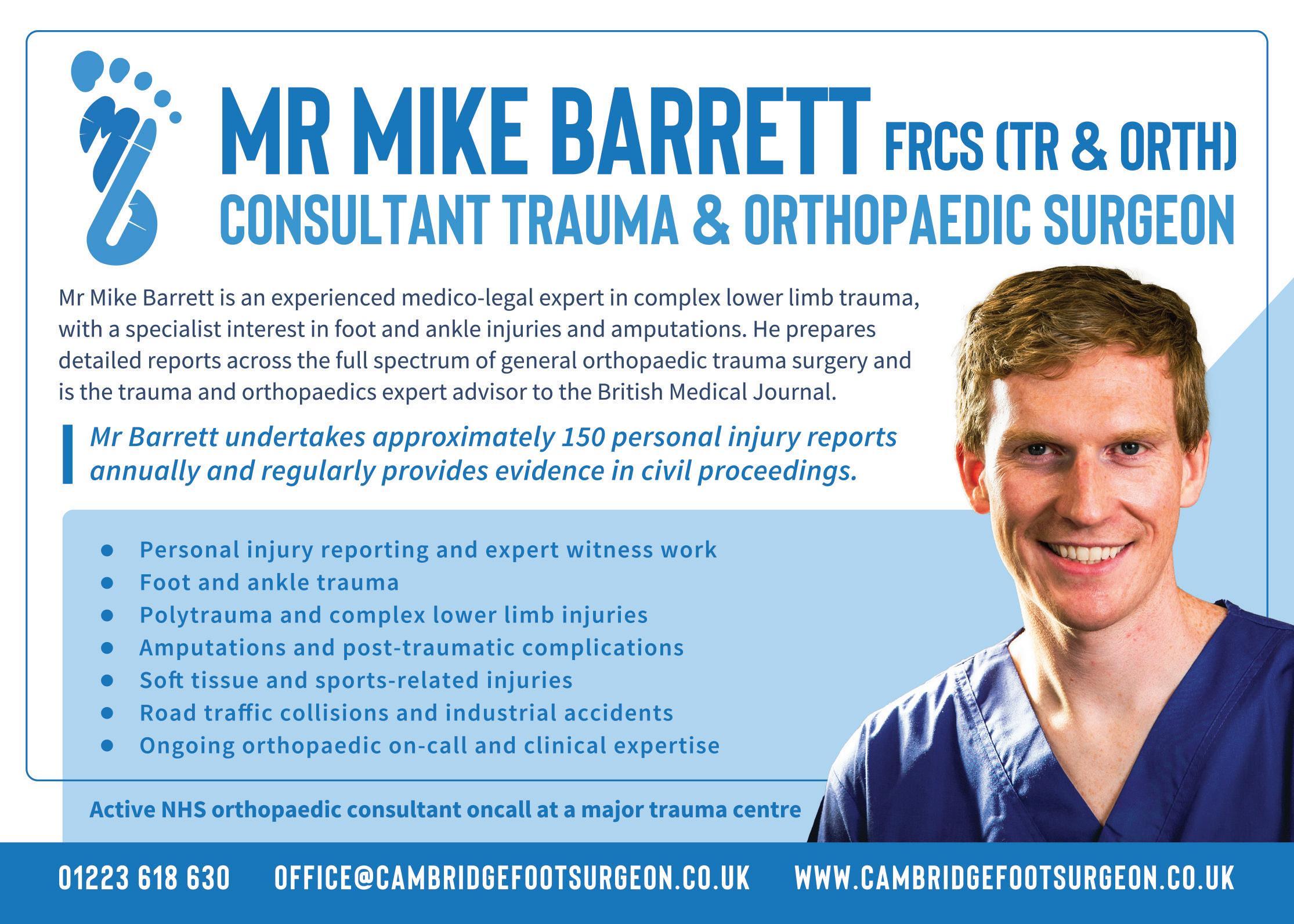

instructed by the defendant. The judge found that in relation to that passage in her report, Dr A “had been partisan and lost sight of her role as an expert and her duty to the court.”
Dr A confirmed that she believed she had cited all the literature she had relied on in support of her report as required by paragraph 13 of the Guidance. Counsel for the defendant pointed out that five paragraphs in her report were plagiarised from an article by Dr Amanda Lucia of the Department of Religious Studies, University of California- Riverside. These paragraphs had been lifted straight out of that article and passed of in Dr A’s report as if they represented her opinion. Dr A had not acknowledged the source of these passages or listed Dr Lucia’s article in the list of materials she had relied on.
Dr A said she was presenting these paragraphs as if they were her own because she held the same opinion as Dr Lucia. However, she accepted that she had not changed the wording, except in places where she had added her own words to make it look as if the section represented her own opinion.
The judge noted that:
“[i]t is difficult to imagine a more blatant breach not just of the provisions of Part 35, the Practice Direction and the Guidance, but, more fundamentally, an expert’s obligation to the court because these passages were, in effect, a deception practised on the court by Dr A in pretending that these passages were her own words, representing her own opinions, rather than the repetitionregurgitation if you like - of the views and opinions of Dr Lucia.”
In one instance, Dr A was unable to explain the meaning of a term in the passages copied from Dr Lucia relating to the “guru’s prasad”. Dr A could not recall what this term meant, saying she had been told lots of things during interviews with the claimants which she wrote down, although this couldn’t recall if that was the case with this term. The judge noted that “[t]his was a further attempt to deceive the court… Dr A knew perfectly well that she wrote those words because she lifted them from Dr

Lucia’s article, not because they were spoken to her by any of the claimants.”
It also became clear that Dr A was not fully familiar with the contents of her report. Under cross-examination, she initially stated that she did not believe that the claimants were suffering from Religious Trauma Syndrome (‘RTS’), she had just stated that is what some professionals believe. However, when it was pointed out that her report stated that “[t]he damage that [RTS] or spiritual abuse has caused these claimants has been vast and even debilitating”, she acknowledged that her previous reply was wrong.
When asked why she said she couldn’t remember this report, she acknowledged that she had not read it before she came to give evidence, suggesting that this was because she had had problems with her computer and printer. She acknowledged that it was not acceptable for an expert to come to court and attest to the truth of their reports without having reminded themselves of their content.
The origin of Religious Trauma Syndrome is an article by Dr Marlene Winell. Dr Winell is the only academic writer Dr A was aware of who recognises RTS. Dr A had referenced Dr Winell’s article on RTS (although dating it incorrectly), however she did not acknowledge in her report that Dr Winell had a vested interest in identifying RTS as a bona fide symptom as she has a business running weekend retreats and an ongoing recovery group for people recovering from RTS.
Dr A also noted in her report that RTS had been compared to complex PTSD which was untrue as Dr Winell had compared it instead to PTSD but not Complex PTSD.
There were also other instances of inaccuracy or, at worst, misleading passages in Dr A’s report such as a statement that there was evidence in the medical records of one claimant starving herself, when there was no such evidence in the medical records. The judge considered this statement was “a pseudo-endorsement of [the claimant’s] account by reference to medical records which did not exist.”
By contrast to that of Dr A, the judge found Professor Maden to be a careful, considered and truthful witness and he accepted his reports and evidence without hesitation. Where they differed, he preferred Professor Maden’s views to those of Dr A in every respect.
The judge concluded that:
“no reliance whatever can be placed on the reports and opinions of Dr A. She demonstrated herself to be an expert who had little or no regard to the provisions of Part 35, the Practice Direction and the Guidance in preparing her reports and who was prepared materially to mislead the court by passing off the views of another person as her own by lifting large passages from that person’s article and setting them out in her report as if they represented her own views without acknowledgement or reference to the originating source. In the circumstances, I consider that I have no choice but to reject Dr A’s evidence in its entirety.” USER SEAN MOSBY

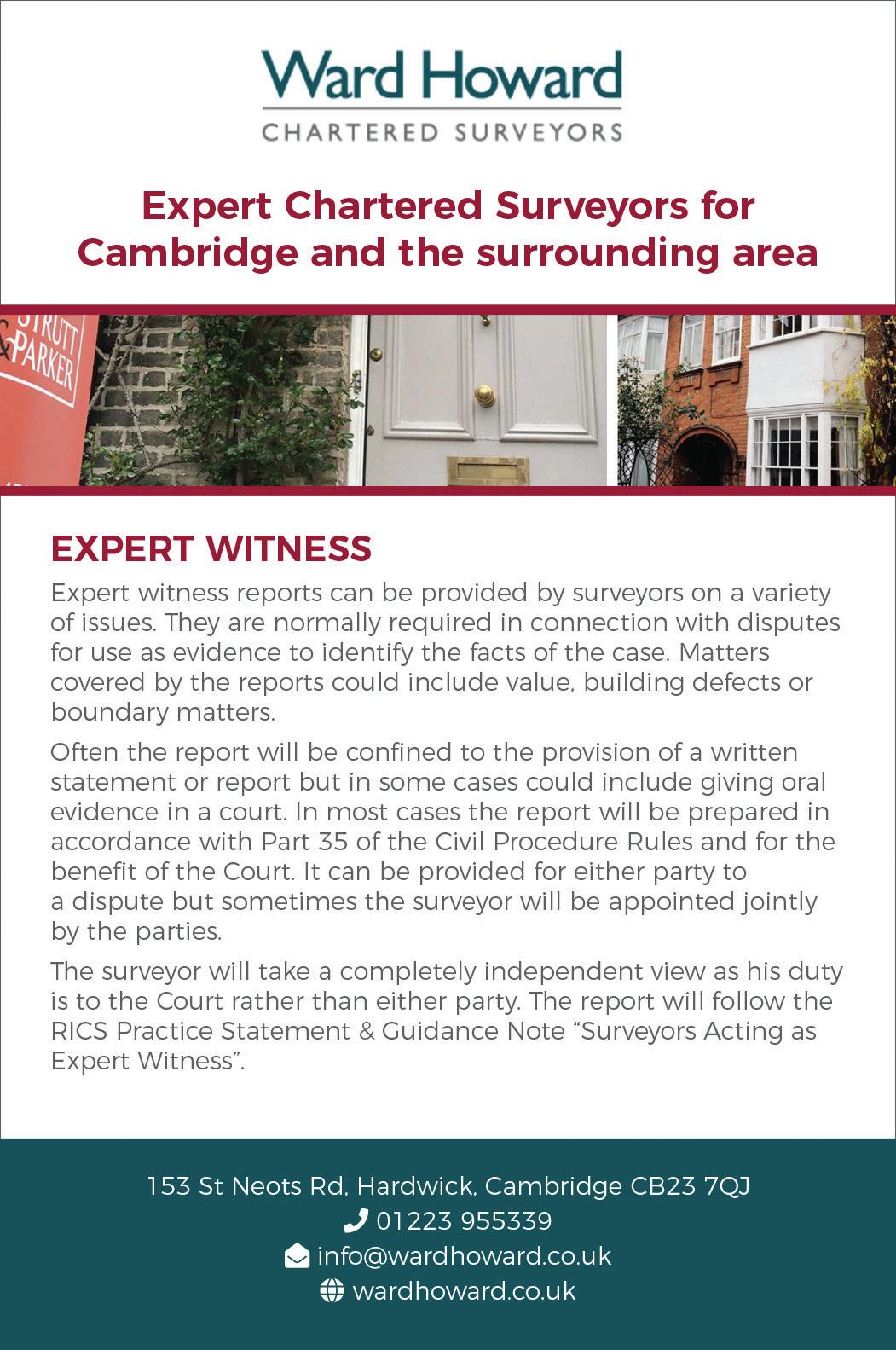

Recently, the solicitors’ professional indemnity market has seen an increase in the number of insurers offering firms primary insurance. With more choice available, how should firms best present their risk - and why should they choose HDI?
As your insurer, we are there for you when the worst happens. However, insurance is just one tool in your armoury against risk. We look for firms that invest in a clear and robust risk management strategy. We want to hear about how you identify and manage risk in your firm. This can include how you structure your firm, risk management planning, business continuity plans, file review and supervision policies, and external audits.
When reviewing a firm’s proposal form, I like to pay particular attention to the answers that provide insight into the workings and values of your firm. Your submission can be really enhanced, for example, by sharing your firm’s history, any particular specialisms, your future goals, the type of work you like to do and the type of work that you would turn away. These details allow me to take a more holistic view of your firm.
Getting your submission in early and in full order is vital. Work with your broker to ensure you have up-to-date claims summaries. It is also very helpful to include a narrative around any open and closed claims — for example, what the allegation was and what lessons were learned. The fact that you may have experienced a claim is not necessarily an issue — at HDI, we recognise that there is often a story behind every claim, and we are open-minded and willing to listen.
Whilst the frequency of claims appears stable, the severity of claims has notably
increased in recent years. Contributing factors include rising asset values, more complex transactions and defence cost inflation. Worryingly, the market has begun to see more claims exceeding the compulsory primary limit. Firms should have heightened risk management measures in place when taking on matters of high value, or when acting for clients of considerable net worth.
Conveyancing remains the main source of claims, both in frequency and overall cost. Conveyancing firms continue to be prime targets for property fraud. Being aware of key red flags and undertaking rigorous due diligence is vital to protect your firm from such claims.

Additionally, there has been a notable rise in claims from wills, trust and probate work. The drivers for this are a combination of more complex family structures, increases in overall estate values and the challenges that can arise with people living longer. Our advice is that this would be a good time to conduct a review of policies and
procedures and implement targeted refresher training for staff.
Beyond this, insurers will be taking into account the economic environment, technological development and other similar contextual factors as drivers for claims, such as the impact of AI, and the continued cyber threat we all face. Sharing your firm’s policies and risk management strategy for these areas helps provide insurers with reassurance that your firm is well equipped to navigate such challenges.
In the past, we have seen volatility created by insurers entering and exiting the solicitors professional indemnity market. At HDI, we have the experience, strength and stability to support you now and into the future. Our recent credit rating upgrade by international rating agency S&P Global Ratings to AA- (Very Strong) is a testament to our financial resilience, enabling us to be your trusted insurance partner.
We look to provide law firms with a highquality, long-term solution. That’s why many of the practices we cover have been with us for the 15+ years as we have been a primary insurer for law firms. We use our specialist experience to ensure that we are the experts for your needs today – and help prepare you for what might happen tomorrow.
If you are a firm with a turnover of under £20 million and would like to obtain a quotation from HDI please contact Lockton Insurance Brokers.
Sarah White Underwriting Manager, HDI Global SE
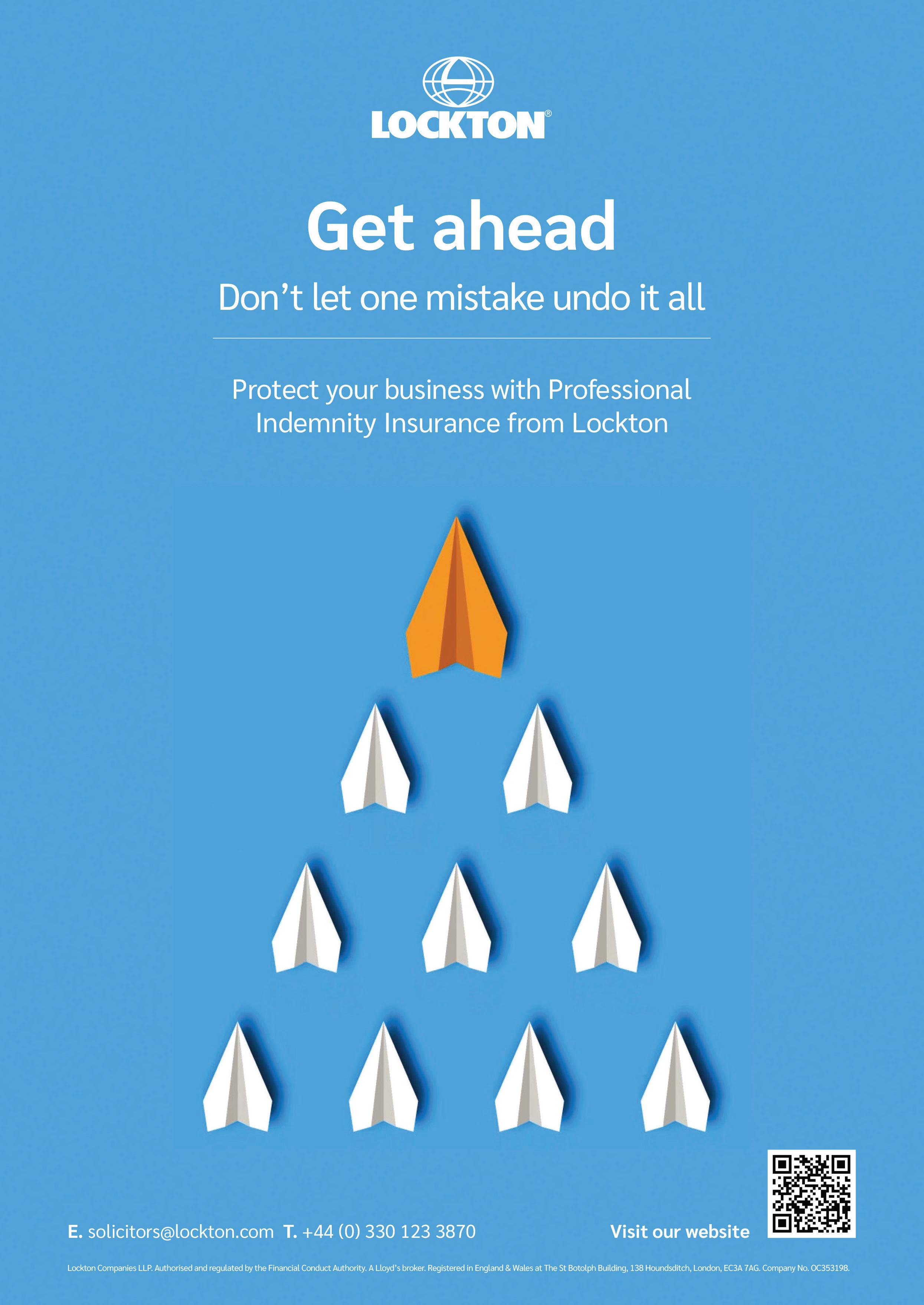
Charitable estates rise 22% from previous year, reaching 46,000
14 May 2025 - Despite a challenging external environment, legacy income rose by 9% in 2024, up significantly from the 1.3% growth seen in 2023. Legacy gifts now make up an average of 30% of fundraised income across the top 1,000 legacy supported charities, with some sectors such as animal, conservation, and disability charities seeing figures as high as 50%.
These are just some of the key findings from The Legacy Giving Report 2025 - the first report of its kind from the Smee & Ford and Legacy Futures’ partnership announced last year that has enabled the most comprehensive legacy data and market review ever available. Designed to support charities of all sizes, the free report provides valuable statistics, projections, and insightful case studies to help charities maximise the potential of legacy income.
More key findings include:
l The average estate size for those leaving a charitable gift was £599,000, compared to £394,000 for non-charitable estates.
l Average gift values reached £65,000 for residual gifts and £4,500 for pecuniary gifts.
l The South Coast and London remain the strongest regions for charitable bequests, with nearly 18% of probated estates in the South Coast containing a legacy gift.
l Baby Boomers (born 1946–1964) now make up 21% of all legators and are set to dominate legacy giving by 2035.
One of the key drivers behind the record growth in 2024 was a 15% surge in charitable bequests, largely due to HM Courts & Tribunals Service clearing a longstanding backlog of probate applications. As a result, bequest numbers in 2024 reached an estimated 145,000 - the biggest number ever recorded.
The report also explores the impact of upcoming changes to inheritance tax rules and highlights opportunities for charities to engage supporters who may be motivated to leave a charitable gift for this reason.
Rob Cope, Executive Director Membership & Operations at CIOF, said:
“Legacies play a pivotal role in supporting charities, of every shape and size, across the UK to continue their vital work. As such, resources like this report are invaluable. In sharing such a comprehensive overview of the nation’s legacy giving, with key trends and projections for the future, The Legacy Giving Report will no doubt become a go to benchmarking and guidance resource for fundraisers looking to develop their legacy fundraising and bolster broader fundraising strategies.
“It is also an excellent example of agencies working together to provide, for free, the kind of unique data and insight that can help charities grow and thrive, something the Chartered Institute of Fundraising is pleased to encourage and support.”
Ashley Rowthorn, Executive Director of Legacy Futures and Smee & Ford, said:
“This report represents an important step in improving our shared understanding of the legacy giving landscape. By bringing together data, analysis and real-world examples, we hope it will help charities of all sizes to better navigate current challenges and plan for the future.
“Legacy income is a long-term, resilient source of support for the sector, and having access to clear, evidence-based insights is vital for organisations looking to grow or sustain this important form of giving.”
The Legacy Giving Report can be downloaded for free here
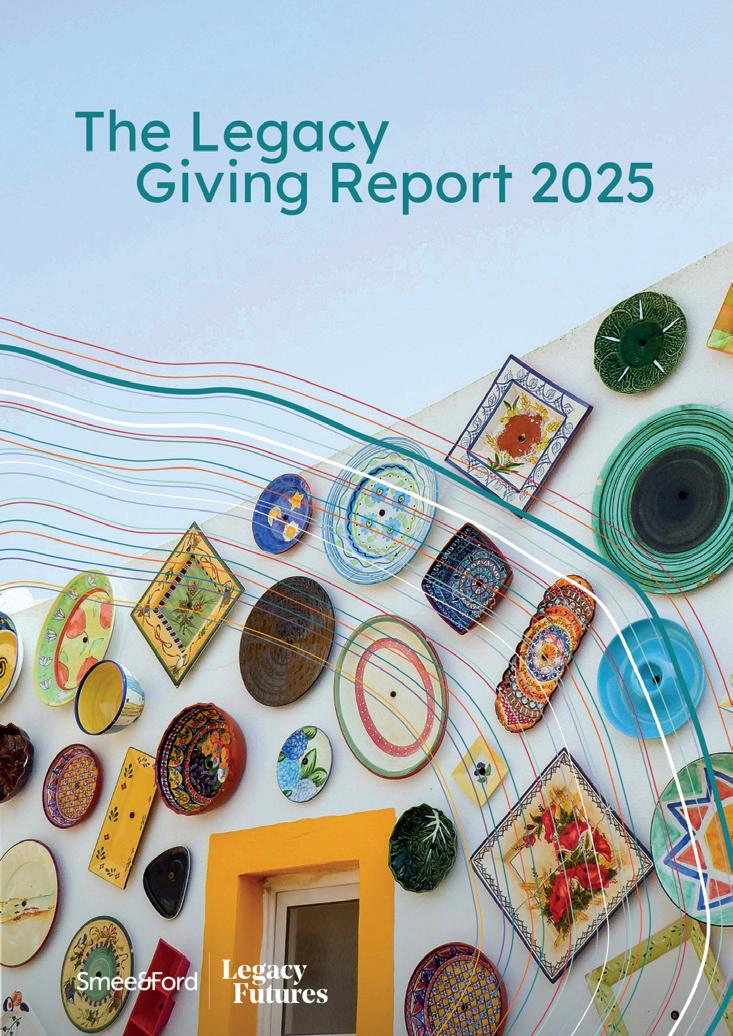
A helpful and free source of data is Legacy Futures’ Data Dashboard, which describes the size and shape of gifts in wills in the UK, and how legacy incomes have grown over the past 30 years.
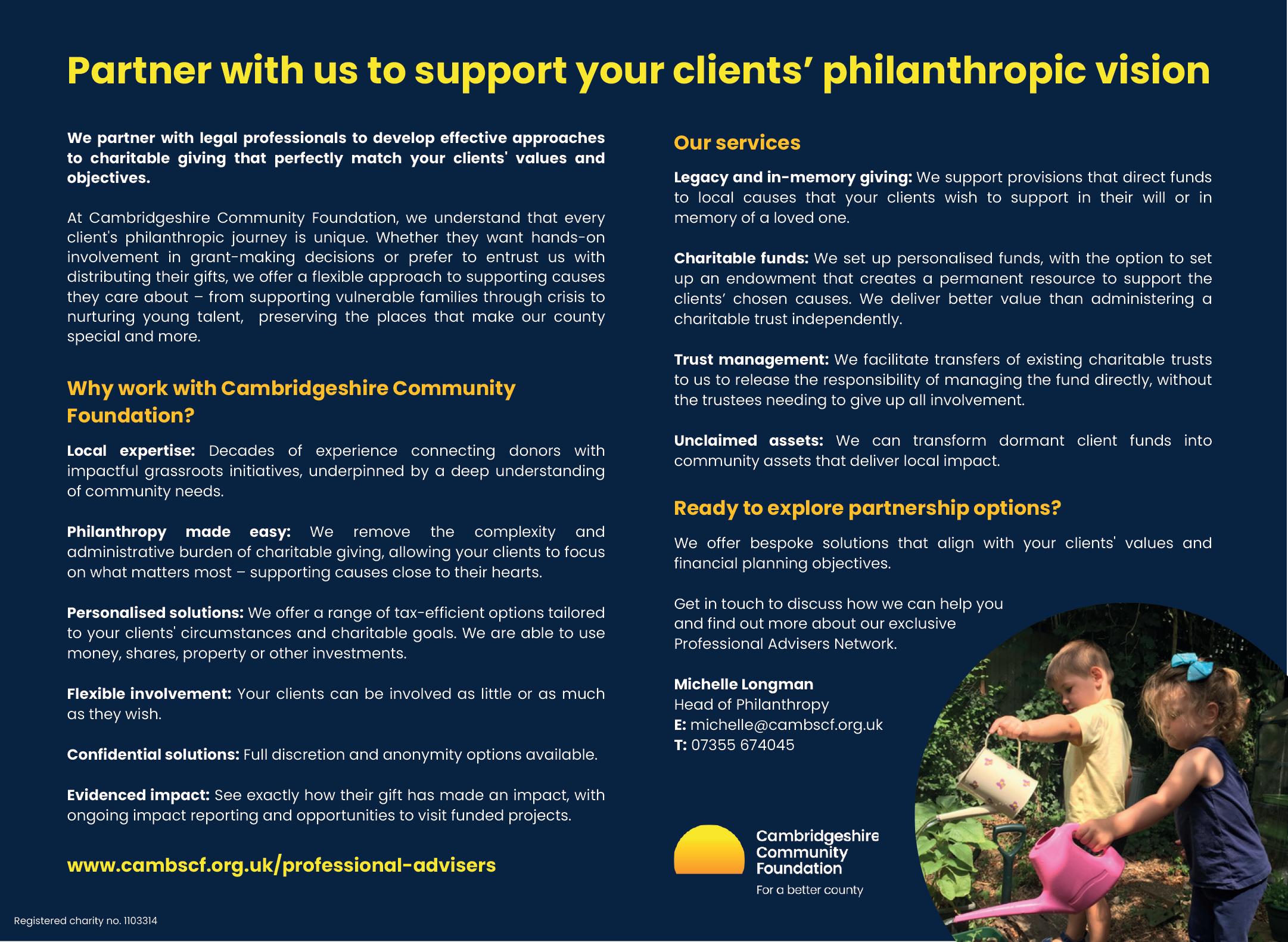

l 92% of professional advisers say that estate and tax planning will become even more important following the Inheritance Tax (IHT) changes announced in the 2024 Autumn Statement;
l 60% say they are already receiving more requests for advice;
l 65% say charitable tax incentives will become even more important to their client base; and
l 62% think more people will consider leaving a gift to charity.
Upcoming Inheritance Tax (IHT) changes are already beginning to influence the charitable Will-writing and estates market, with professional advisers reporting an increase in demand for estate planning advice and predicting a rise in charitable legacy giving, according to new research from Remember A Charity*.
The changing IHT landscape In the Autumn Budget 2024, the Chancellor announced that IHT thresholds would remain frozen until 2030, with pension wealth no longer exempt from IHT from April 2027. As such, it’s estimated that the proportion of estates facing an IHT bill will almost double by 2030**.
Released today, Remember A Charity’s Professional Adviser Tracking Study – carried out by Savanta –reveals that 60% of professional advisers (solicitors, Will-writers and financial advisers) are reporting an increase in requests for advice about estate or inheritance planning since the IHT changes were announced. 9 in 10 advisers expect estate and tax planning to become more important under the IHT changes (92%), and that more people will need to consider how to mitigate the tax due (91%). Only 15% think there will be no discernible impact from the changes.
As more estates fall within the scope of IHT, two thirds of advisers believe that the charitable tax incentives will become an even more important consideration for their clients (65%), and that a greater number of people will consider leaving a gift to charity from their estate (62%). Charitable gifts are exempt from IHT and estates that donate 10% or more of the net value can qualify for the reduced IHT rate of 36%.
Tanya Watson, Chartered Tax Adviser and Senior Director at Alvarez & Marsal Tax LLP, says:
“The changes to IHT are prompting a fundamental reassessment of estate planning strategies, particularly among clients who may not have previously been impacted. What we’re seeing is a growing need for tailored advice that balances financial objectives with personal values. Charitable giving can be a highly effective planning tool, and these changes provide a timely reason for advisers to revisit legacy plans with clients who may not have considered this route before.”
Eleanor Evans TEP, Partner, Trusts and Estates Administration at Hugh James, says:
"We’re already seeing an increase in clients seeking early advice on estate planning. Many people choose to leave legacies to benefit a cause they care about, and the tax breaks for gifts to charity provide an added incentive. As more estates will become liable for IHT once the changes take effect, charitable giving is becoming an increasingly important part of the estate planning conversation."
Advisers communicating charitable giving more actively When it comes to Will-writing, over two thirds (77%) of solicitors and Will-writers now say they always or sometimes proactively raise the charitable option with clients (up from 72% in 2023). Charitable gifts are becoming more prevalent over time, with an average of 21% of Wills written through a solicitor or Will-writer now including a donation.
This rises to 24% amongst those who always reference charitable legacies with clients and falls to 14% of those who never do.
Tax incentives are the most prevalent reason advisers give for raising the topic of legacy giving with clients. 92% of solicitors and Will-writers and 86% of financial advisers in the study say they always or sometimes advise their Will-writing clients of the charitable tax incentives.
Lucinda Frostick, Director of Remember A Charity – the consortium of UK charities working to grow the legacy giving market, explains:
“Across the advisory spectrum, we’re seeing more advisers referencing the option of charitable giving when talking to clients about their estate and inheritance planning. While the reasons for giving extend far beyond tax incentives, the fiscal framework forms a natural starting point and these IHT changes make the legacy conversation even more relevant to a wider group. This is helping to build understanding of legacy giving and to inspire more people to support the good causes they care about – alongside their loved ones –from their estate.”
Remember A Charity works with professional advisers, legal partners, regulators, trade bodies and government to build awareness about legacy giving. Find out more at www.rememberacharity.org.uk/advisers
A summary report of the findings is available here.
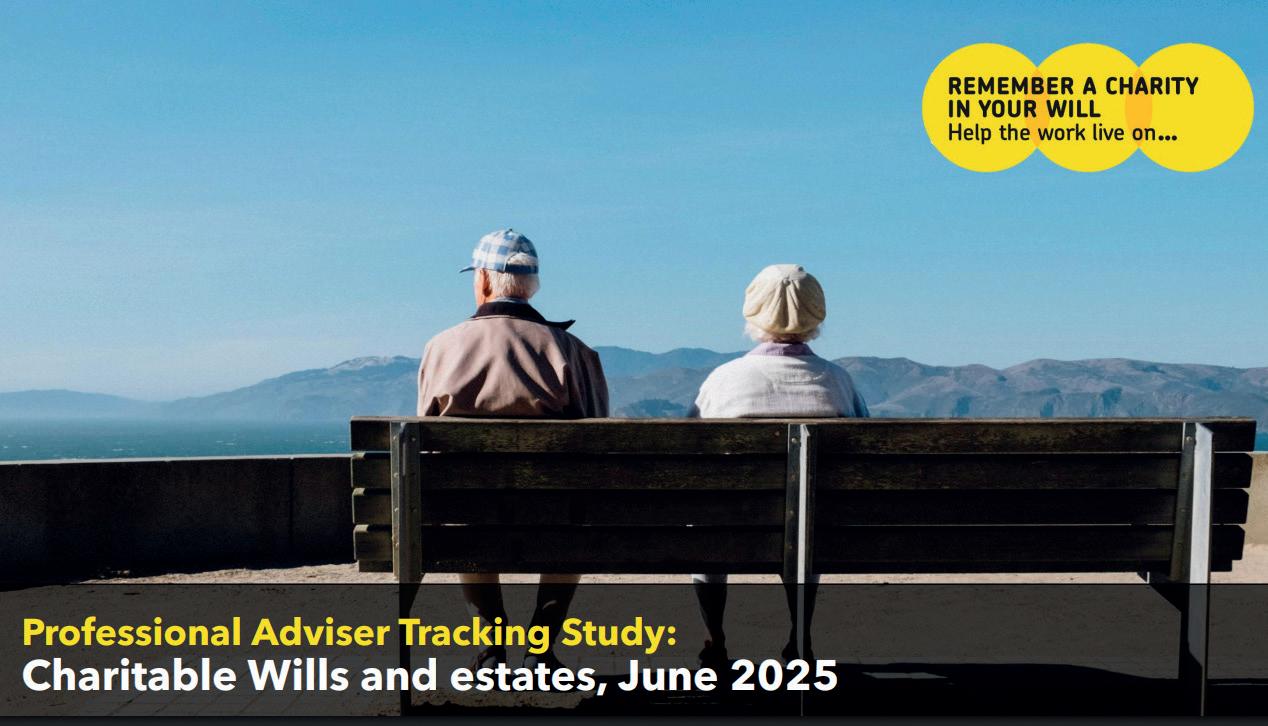
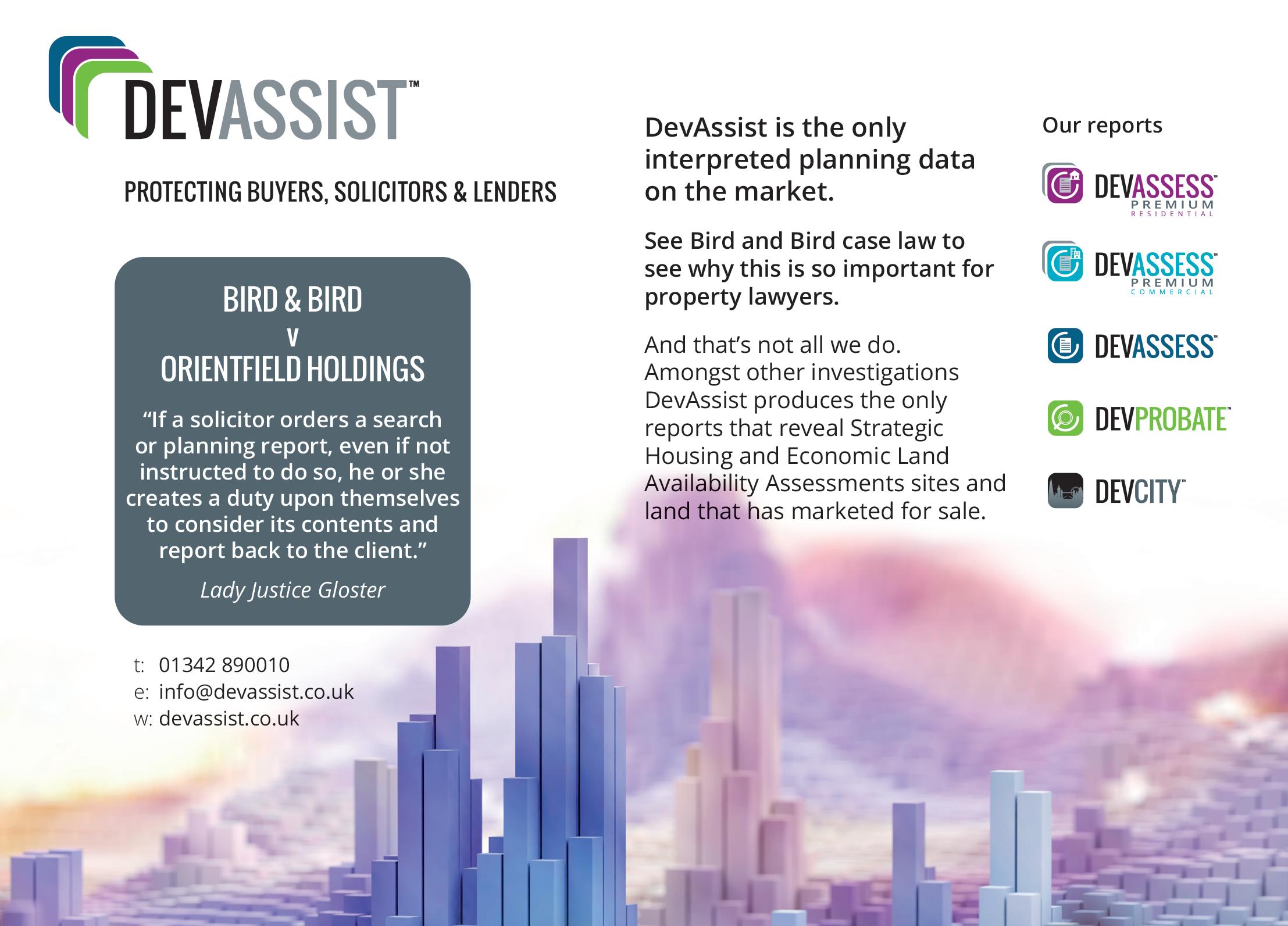



And the level green
By Luke Clements
ISBN 978 1 91364 807 7
LEGAL ACTION GROUP
The access to justice charity www.lag.org.uk
There is very little that strikes more terror in the souls of its victims than the threat of impending homelessness via the judicial processes involved, which culminate in the process of eviction.
There ought to be an erudite and readable le book about it - and there is, thanks to this very useful publication from the Legal Action Group (LAG), the access to justice charity, who are justly famed for producing legal texts accessible not only to lawyers, but to the average concerned reader. David Renton, the author, is a barrister who represents tenants and mortgage holders embroiled in possession hearings.
Published in handy paperback format, the book offers a broad and concise coverage of ‘the use of the principles of equality in housing law’ - and equally of prime importance - the duty of landlords to fulfil their duties under the general categories of fitness and repossession.
As the publishers point out, the book covers the often complex and controversial matters, for example, of council houses let by housing associations, as well as houses held in thrall either to mortgages, or long leases. It should be added that homeowners in mortgage arrears suffer the same anxieties as those who rent - hence the general and urgent need for all practitioners to be duly bound in support of clients who struggle with these and other difficulties in the housing sector.
Practitioners and clients alike coming to grips with these problems will find this book especially helpful. As a concise work of reference, it truly excels. The precise introduction points directly to the subject of the book, namely the Equality Act of 2010 and its related principles - which apply both to business premises and residential properties.
Straightforward to navigate, the book has a detailed table of contents, enabling the reader - lawyer of not - to find the necessary advice they may be looking for, and for
those doing further research, the book contains extensive footnotes, plus a detailed and useful index at the back.
Note too, the particular advantage of a 30-page section of precedents - including for example, the precedent entitled ‘Case Summary Application to Set Aside Possession Order.’ Also included in this concise text are Tables of Statutes, Statutory Instruments and also a Table of European and International Legislation.
For practitioners and clients alike, this book emerges as a practical and indispensable purchase.
The date of publication of this paperback book is cited as 2024.
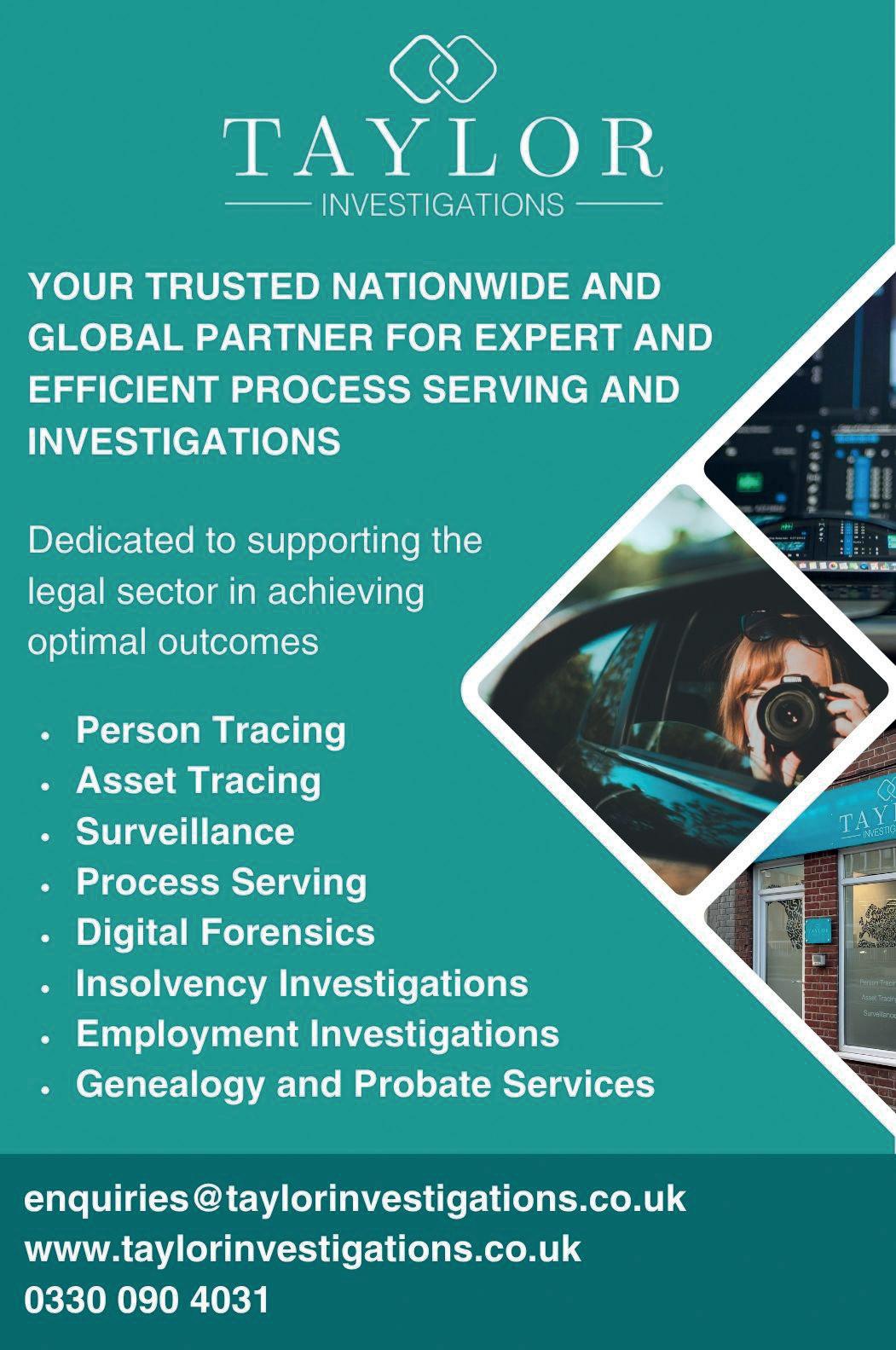
In April we celebrated our first birthday as FHM Forensic Accounting. Although only founded a year ago, our expert Fiona Hotston Moore has over 20 years’ experience as a forensic accountant and expert witness. Our Associate Director, Tom Arnold, is a qualified accountant and has worked alongside Fiona as a forensic accountant for almost five years.
In addition to Fiona and Tom, who lead on all client assignments, we have Graham Hines who is our Managing Director and co-founder. He looks after all the back-office including technology, website, finance and compliance.
In May we were delighted to welcome our fourth team member, Kirsty Shuckford. She joined the FHM team as an Assistant Manager. Kirsty is a qualified accountant with five years’ experience working both in accountancy firms and also as a financial accountant in a global business.

In addition to the core team, we are delighted to work with other professionals. This includes tax and corporate finance specialists and allows us to provide a first class and seamless advisory service to our clients. We do not provide ongoing accounting or tax compliance but we can suggest appropriate firms.
As a team we have adopted fully remote working. This delivers an excellent work-life balance for the team and means we operate in a sustainable way by eliminating the need for dedicated office space… and the daily commute.
Of course, as forensic accountants, we do like numbers and financial analysis so here are a few of our statistics.
In our first year, we accepted 102 engagements. Of these 48 were appointments as Single Joint Expert in matrimonial cases or shareholder/commercial disputes. Thirty engagements were as Shadow Adviser or Party Expert and another ten were company valuations for tax or strategic planning purposes. About a quarter of the instructions came from law firms based in East Anglia.

Businesses we have valued for dispute, divorce and tax planning cases have been in a wide variety of sectors. These include dentists, wealth management, law firms, accountancy practices, technology, media, farming, property, construction, industrial services, fashion, hospitality and retail.
We plan to continue focusing on our mission to help clients resolve financial disputes and problems in an efficient and cost-effective way. Whether the case is large or small, we provide opinions that are clear, relevant, credible, informed and cost-proportionate.
Our specialist forensic accounting services include:
• Business valuations
• Divorce and matrimonial matters
• Shareholder and commercial disputes
• Professional negligence claims
• Private client and family matters
By continuing our focus on business valuation and forensic accounting we hope to further expand our law firm network and to recruit additional qualified accountants who would like to specialize in forensic accounting.
Over the next few months, we will continue our webinars series for our legal contacts and, if you would like an in-house training session or virtual meet-up, please do let us know.
Our website has details of our services and also lots of relevant articles on business valuation and forensic accounting. You can also download our brochure, CVs and tax cards.
(0)7770 642491
